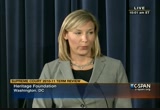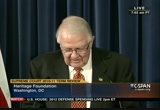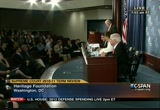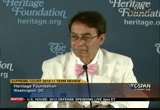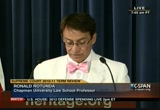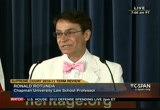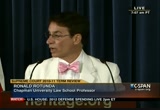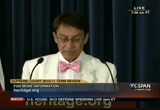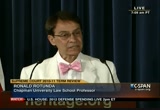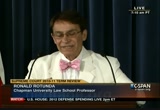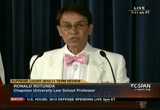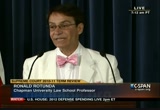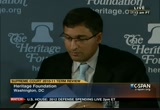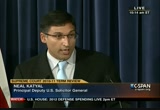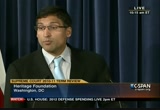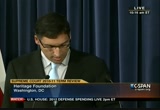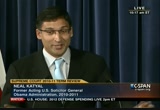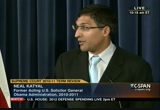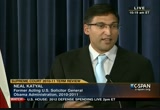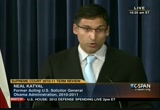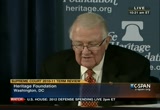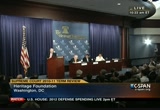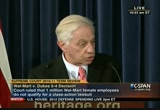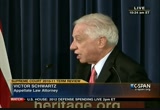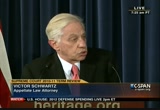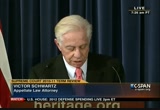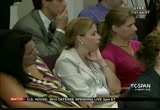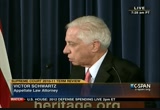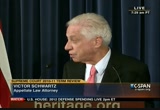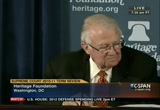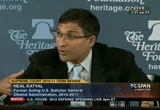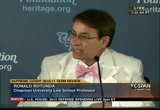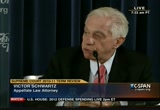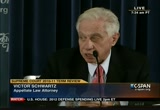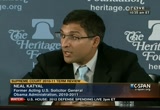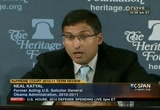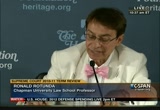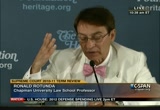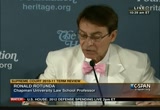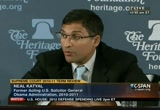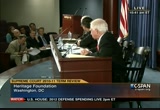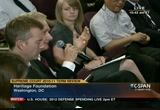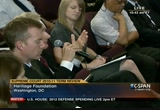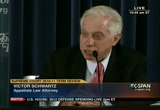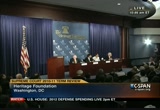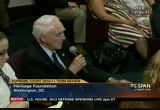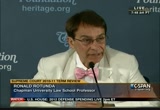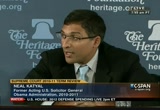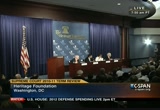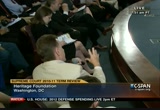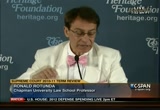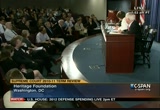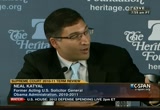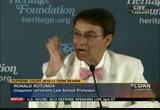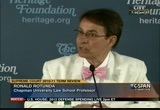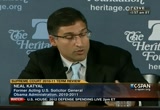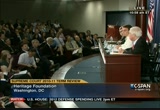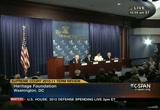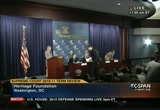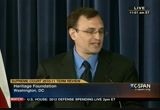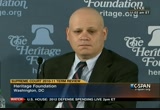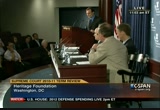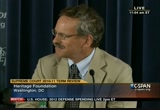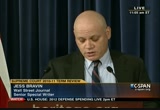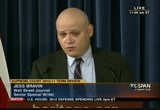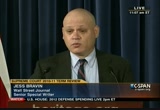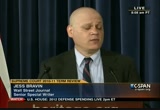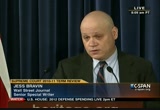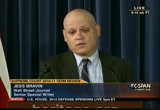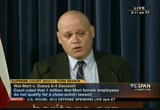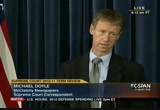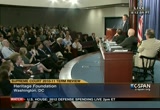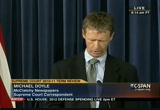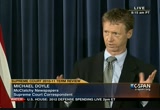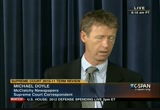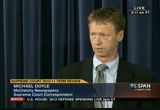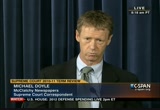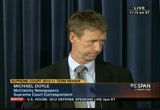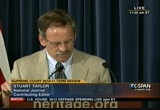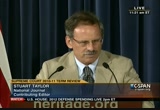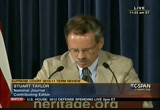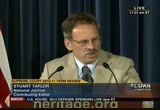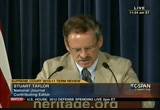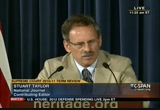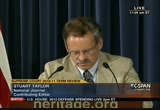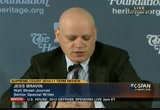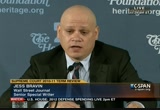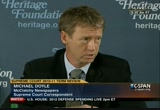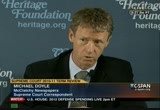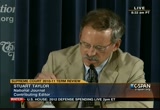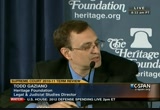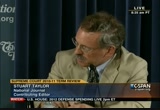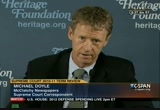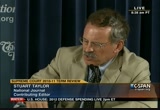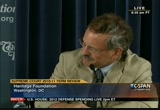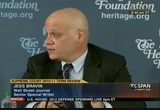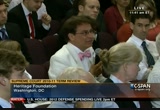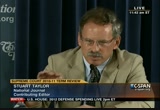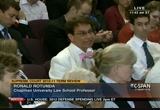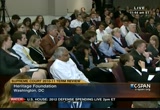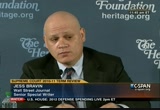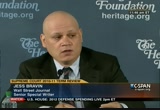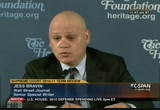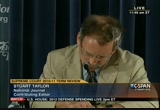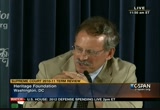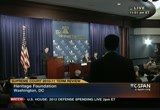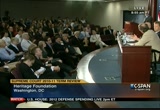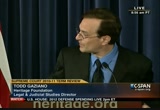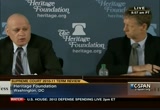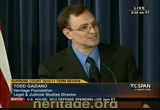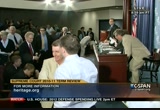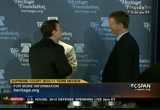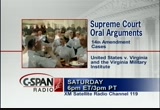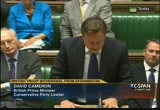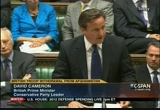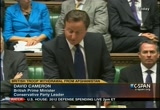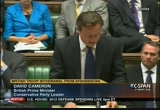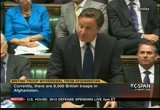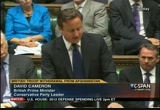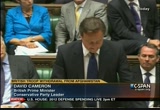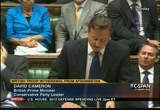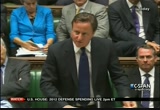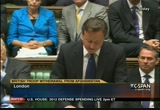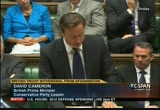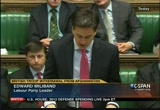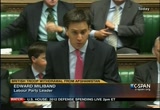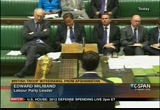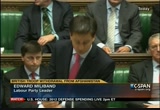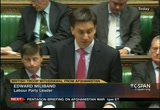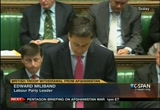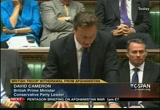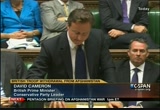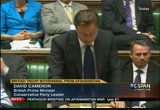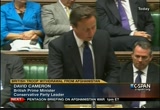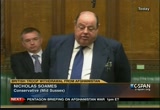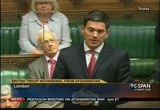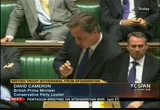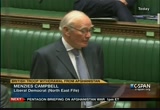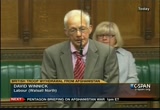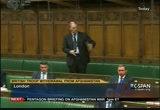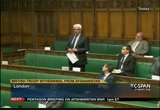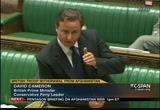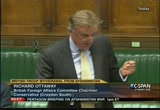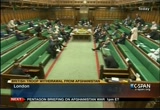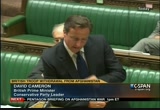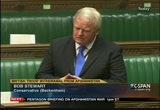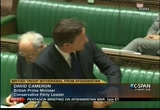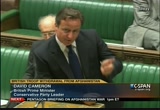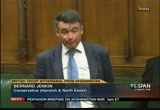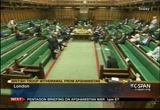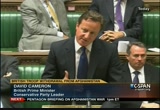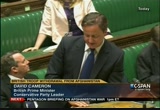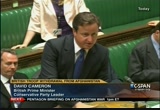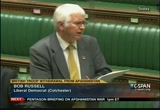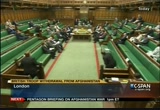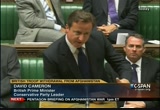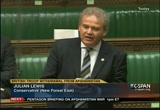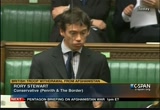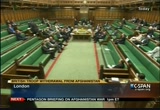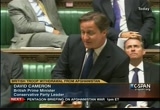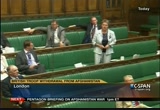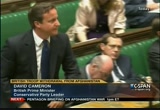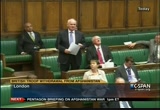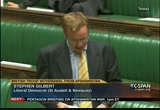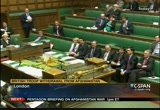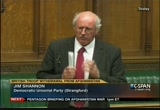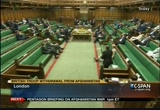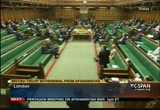tv U.S. House of Representatives CSPAN July 6, 2011 10:00am-1:00pm EDT
10:00 am
figure something out without raising the debt limit. host: is that possible? guest: i agree. they should get together, but even congressman ryan's budget would have acquired -- required an increase of something like two dollars trillion. we are spending a large amount of money, more than we are taking in, and part of that is because of the weak economy due to the recession that we have not recovered from fully. if we try to cut spending overnight by 40%, then you really are talking about cutbacks on things like social security, and instantaneous cutbacks in areas. those are not broadly supported. host: for more information
10:01 am
about the bipartisan policy report, go to their website. jerome powell, thank you for your time. that does it for today appenzell -- for today's "washington journal." thank you for watching. [captioning performed by national captioning institute] [captions copyright national cable satellite corp. 2011] >> we discuss the supreme court cases of the past term as well as look forward to the next term. i want to remind you to turn off or silence all cell phones. and if you could please -- if you're interested in asking questions, if you could go to speaker@heritage.org. to begin we will have moderating our first panel mr.
10:02 am
edwin meese. he's also the 75th attorney general of the united states. mr. meese. [applause] >> well, thank you, rachel, and thank you, ladies and gentlemen. i join with rachel in welcoming you on behalf of heritage. that's specifically our center of legal and judicial studies. we're jointly presenting this program today on our annual scholars and scribes review of the supreme court term. well, of course, the most looked for event at the end of every supreme court term didn't take place this year. that is nobody retired. at least so far. but looking back over the term it's been an interesting term. you are going to hear about it from the experiod of times, both from the legal community and the journalistic community. we have continued one tradition and that is that the most
10:03 am
overturned circuit was, of course, the ninth circuit. our friends from the western part of the united states with 84% reversal record. now they would have been the -- had the highest percentage except for the second circuit. technically they outdid the ninth circuit. in terms of reversal the ninth circuit is still ahead. there were 67 opinions in which they decided the merits of the cases. so you'll be hearing about those today from our experts from the legal and journalistic communities. and they are starting off, ron rotunda who is the distinguished professor of jurisprudence at chapman university in california. he's also been on the faculty at george mason university school of law here. he's a graduate of harvard
10:04 am
college and harvard law school. he has clerked for the second circuit. he's co-authored for the most widely used book on legal ethics. he's also written a number of things on that and other subjects. he was the constitutional law advisor to the supreme national council to cambodia and insisted on writing that country's first democratic constitution. he's also consulted with democracies throughout the world after the implotion of the soviet union as more and more new countries around the world were able to write democratic constitutions and develop democratic governments. he's been active in the american bar association in regard to professional responsibility. he's also served as special counsel in the department of defense along with many other contributions to the legal profession and to the country. he has been selected as the best lawyer in washington,
10:05 am
d.c., in 2009 in ethics and professional responsibility. and right now in california he's a commissioner of the fair political practices commission which is that state's political watchdog. so to kick off our scholars, let me introduce to you ron rotunda. >> thank you. [applause] >> thank you very much, ed. i wished my mother-in-law were here to hear this. anyway, the -- i remember chief justice rehnquist was asked by a reporter once, you have all these big cases at the end of the term. this is a true story. why don't you spread them out more evenly so we can cover them? and he said, why don't you spread out the reporting more evenly? because we have to do it all at once. we have an opportunity now that we have the chance to read the cases for both the press and the professors to comment. i want to start off with a
10:06 am
bankruptcy case, marshall. marshall is print -- pierce marshall, son of the old mr. marshall, who married vicky lynn marshall, also known as anna nicole smith. what i find is chief justice roberts starts off the case by referring to one case. i had written an article about this case. the chief had a chance to cite me but sadly he did not. the reason this is really a very poor civil liberties case is even it's a bankruptcy case it has to deal with jurisdiction. pierce sued vicky for defamation. anna nicole smith. anna nicole smith sued in probait court said you interfered because your late father who showered her with
10:07 am
gifts in her lifetime was going to give me another gift and he didn't because of your fraud. she then filed for bankruptcy in california. she loses the probait case before the state court before a jury and she filed in the bankruptcy court the probait case still going on and pierce filed a claim in bankruptcy saying that the defamation case should not be dischargeable in your bankruptcy. and that brings in the case on tortious interference. and the supreme court says bankruptcy judges, they have no lifetime tenure. they are not confirmed by the u.s. senate. they don't have all the protections that we expect of federal judges so they cannot decide these basic article 3 cases. the 5-4 opinion, this is one case i think where the president's appointment affected the vote would have been 6-3 had it been justice
10:08 am
stevens instead of justice kagen. the case that -- an earlier case called northern pipeline, an earlier case had said some years ago in 1982 that there are limits to giving article 3 power to nonfederal -- we call them judges. they're bankruptcy judges. we call them hearing officers. we could call them clerks of the court. they're not judges. we give them a fancier title. it helps with their -- with their reservation. judge so-and-so. but they are in no way article 3 judges. if we could give them article 3 business, where would it stop? there was something in the northern pipeline case it shouldn't go this far. it wasn't in majority. in plurality, justice marshall,
10:09 am
justice blackman, justice stevens, they all thought you shouldn't do this. we now have a majority of the supreme court in a solid majority coming to the same conclusion. and that i think is very significant. the structural changes served to protect us. we think of them as little fights between the branches, but they're more than that. it limit congressional power to nonjudicial business, noncore article 3 business to people who aren't judges. we only have seven minutes. i'll be brief. i'll talk a little bit too fast. at the end of seven minutes i'll stop even though i may not quite be done. another case i want to briefly mention, also, has to do with standing. i think, you know, talk about this more because this is a case where justice stevens for the majority was channeling the acting solicitor general quite
10:10 am
literally. we have a federal income tax. to some extent the federal income tax is inconsistent with the federal system because there are lots of things that the federal government can do by either taxing you or giving you a detux to encourage to you do certain things, to give you credit. so the supreme court decided a long time ago you can't challenge federal action simply because it uses tax money because everything uses tax money. you have to print up the bill. but they realize that we wouldn't want the federal government to tax all of us in order to build a national church. and so there is a special exception under the establishment clause in cohen you cannot tax me even one farthling. they're quoting an old james madison, even one pence in order to build a church. the establishment clause limits the taxing power in that way,
10:11 am
but the supreme court has limited the possible extent of that opinion because the court has said for many decades that we don't want everybody and his brother to be able to challenge any constitutional -- any act on constitutionality. they have to be personally heard, personal standing. we realize in the government does tax me to support a church it doesn't affect my tax bill. that is the government taxes, the government spends. we know there's no relationship between the two. after all, we're in deficit some trillion dollars, multitrillions. let's think of it this way. this instant all of our debt was gone. it wouldn't change our taxes at all because congress has to pass a special bill for that. so, of course, they said, for example, that congress can give property to the -- this case it was the executive branch giving property to a religious organization some protestant church because that was
10:12 am
distributed pursuant to the property clause, not the taxing and spending clause. well, in the christian school case the court said that credits don't count. that is, credits -- we've always allowed tax deductions. these are credits and credits is just like deductions. the only difference is they help poor people more. credits help rich people because of our resident income tax. i've been babbling on. the court is -- time is about up. i'll make a brief references to the -- another case in california. by the way, the -- the california court was also reversed. i think that one was one of the few cases that the ninth circuit was affirmed and that had to do with video cases that are -- have lots of violence. and basically the court said all kinds of things have lots of violence. watch the tv news. watch the live coverage of the
10:13 am
war in the gulf and we only can -- we only can restrict speech because it's obscene and violence is not but obscene. thank you very much. [applause] >> our next speaker is neal katyal. neal is a professor at georgetown university law school. he's been the principal deputy solicitor general and was acting solicitor general of the united states. he's clerked for supreme court justice steve brier as well as guido calabrize in the ninth circuit. he attended yale law school. he's been named lawyer of the year in 2006 by lawyers u.s.a. he's one of the 90th greatest washington lawyers in the last 90 years by "the legal times," one of the advocates of the supreme court by "washingtonian magazine."
10:14 am
his credits go on for many pages here. his academic interests as a professor are in constitutional law, criminal law and education law. so please join me in welcoming neal katyal. [applause] >> thank you. it's very delighted to be with you. having left the government a couple days ago, i will not talk in kept about cases when we were involved in the government. i will not talk about health care, but i am happy to give you an overview of the term more generally and to kind of give you some of -- my kind of public reactions to some cases. so i thought i'd start unquantitative. i thought i'd start with some data. an overview, what did the supreme court look like? what did 2010-2007 look like.
10:15 am
two were affirmed by an equally divided court. five of those cases were simile reversed and two were dismissed for other reasons the court took them off the docket. the court reversed in 57 of the cases it reviewed, rough low 70%. historical par with previous terms. the number of cases they took were roughly the same in previous terms with the exception of the 2006 and 2007 term when they had what lighter docket. now, obviously the biggest change in the court this year was the replacement of justice cagen for justice stevens. -- kagen for justice stevens. and one is asked, how much of a difference did it make? a bunch of people at the beginning of the term thought she would be recused from a number of cases and that would have an impact. we now know from the data that at least knew mayorcally it's hard to make that -- numerically it's hard to make that case. 28 cases she was recused.
10:16 am
they didn't really, according to the numbers, matter. 15 of those cases in which the justices were unanimous. 11 came in cases in which the decision was either 6-2 or 5-3. so the two cases in which it made a difference were the ones in which the court affirmed the judgment below by an equally divided vote. one was the costco case involving the first sale doctrine, copy write law, and florida was the o.l., which considered the constitutionality of the statute of about citizenship and whether out of wedlock mothers and fathers had different standards under the equal protection clause. so justice kagen wrote seven opinions of the term, seven majority opinions. that's on par with what her recent predecessors did. she agreed most frequently with justice sotomayor roughly 70% of the time. she disagreed mostly with justice thomas. they are agreement rate was about 62%. one other dynamic that the numbers don't capture, and
10:17 am
those of you who have been to the court this year and if you have the opportunity in the next year or two to go, i strong low urge doing it. or at least listening as now the new court has made these all oral arguments available on mp-3 for download. it's a remarkable thing to hear the chief justice, justice alito to have oral argument. these three have all been in the solicitor general's office. they know painfully well what it's like to argue on the other side. they are really good at asking the question you don't want asked. it's an interesting dynamic on the court right now. it makes oral argument tremendously thrilling and terrorfying for the advocate. one maybe perhaps slight corrective to what general meese said and it's odd for me to be defending the ninth circuit. i haven't been in that position for a long time but this year
10:18 am
the ninth circuit numbers look roughly similar to the others in the other circuits. my numbers were a little different than general meese. i have 79% reversal rate for the ninth circuit compared to a 72% reversal rate overall for all circuits. but, you know, it's close -- it's close to the other circuits. what the difference, i think, is the number of cases, the absolute number from the ninth circuit. the ninth circuit was reversed 19 times this term which is more than triple the number of reversals from other circuit. the sixth circuit came in second with five reversals. but it's the number of cases that is quite remarkable. they took 26 cases over the last term compared to only 15 in the ninth circuit in the preceding term and 16 in the term before that. in the term to come, the 2007 term, they have already granted 16 cases from the ninth circuit
10:19 am
and their docket is, you know, only roughly half full at this point. i have been preaching the importance of the federal circuit and patent law for years and i think this year the numbers -- the number of cases that came from the federal circuit are quite remarkable. they contributed 9% of the cases to this year's docket. and i think we're seeing that trend going to continue in the future as intellectual property becomes a driver, a major driver of the nation's economy. another way people can look at the term is how ideologically the court was divided. there is metrics. what is the rate of unanimity in the court? this was quite striking. 48% of the case decided by unanimous vote. you can look at the number of 5-4 votes. 5-4 votes 20% of the cases were decided by a 5-4 vote or 5-3 vote which is a recusal which
10:20 am
is similar to the previous five terms. that average is 22%. so roughly the same. those statistics will not tell the whole story. some of the cases look really deeply contested but term out to be unanimous. at&t vs. f.c.c. is a good example. when the case was granted people said it was the next citizens united. it involved the privacy rights of corporations. and, you know, the statute, the freedom of information act grants rights for personal privacy and what the corporation, at&t, said we have rights of privacy here because person is defined to mean corporation under the federal code. that argument didn't work too well because as the chief justice pointed out in oral argument the word is personnel privacy and there is a situation in which words mean different definitions from the root.
10:21 am
craft and craftee, squirrel and squirrely and pastor and pastoral. and the chief justice writing for oral argument said at&t didn't have the right to personal privacy. and he said, we trust that at&t will not take it personally. [laughter] there was a high rate of so-called ideological division for the term in the case of 5-4 or 5-3 decisions which had a, "liberal" result. my time is up. i would like to talk about the global warming case in the question and answer period. thank you. [applause] >> thank you, neal. our next and final initial speaker is victor schwartz who is dean of the tort law advocates. he's a partner in the washington, d.c., office of the kansas-based law firm, shook,
10:22 am
hardy and bacon, where he chairs its public policy group. and that group is devoted to public policy issues that will help improve our civil justice system. he also has an active appellate practice. he serves on the board of directors of the civil justice institute at george mason school of law. he's also has served in the past as professor and acting dean at the university of cincinnati college of law. he is chair of the federal interagency task force or product liability at the department of commerce. he has been in the past. he's life member of the american law institute, the restatement of torts and he's been named by national law journal as one of the 100 most influential lawyers in the united states. so it's great to have him with us. please join me in welcoming victor schwartz. [applause] >> well, thank you, general meese. when i was asked here i
10:23 am
thought, hmm, because i'm schwartz on torts, so i -- but they have me here anyway. so let's talk about civil justice. all of you know about the wal-mart case. that was given a lot of publicity and the court in majority adhere to what class actions are all about. class actions occur when things are uncommon. and here you had a million women who claimed that they were discriminated against, that they had lower pay, that they didn't get raises, and yet as justice scalia said, there was no glue that held the class action together. it was different people and different areas, decisions were made locally. the decision was correct and i hope the cry goes out to every court in america not to certify these huge class-actions because what they do it's for a defendant. i mean, the checkbook has to come out because you've
10:24 am
certified a class and you are going to be in for a real problem. i would expect that the plaintiff's will go to -- the plaintiffs will go to congress for that. they did that with ledbetter. i don't think they will be successful here. they bring smaller, their own cases if they wish, and it's -- if they've been discriminated against, it's not enough for an individual case. then the puzzle, i was thinking about this this morning because the tv is filled with this casey anthony case and probably every american can give you an opinion on it. 70% of americans who take drugs know they no longer will be able to bring a lawsuit if they take a generic drug. 70% of americans take a generic. and the supreme court held that preemption applies with generic drugs. why is that true? two years ago said if you take a brand name drug you can bring a tort suit.
10:25 am
it's the engine for safety and there's no preemption. well, with the branded drug, a company can change the warnings without going to the f.d.a. they have to ask forgiveness, not permission. with a generic drug, however, they cannot change the warnings by them self. they have to get permission first. so, america, if you take a generic, you're not going to be able to sue for duty to wash. if you take a branded name you can. if you have a medical device you can. so, america figured that out. the plaintiff's bar will be in congress, believe me, to try to have preemption for everything. then, they had jurisdiction. companies held up in the united states and when can they be sued? because of time limits i can't go into detail so i'll just get to the bottom line of mcintyre and goodyear. say if you know a product will be used in the stream of commerce it's not enough to allow some of you to bring a
10:26 am
lawsuit against you. you have to target. you have to target a particular state. in the case that was probably most extreme from point of view of those who think we should be able to sue foreign companies more easily, there was a distributor who was ordered by the company, made machine pools, to sell as much products as possible. but they never, the defendant ever said to sell anything in new jersey. and they made no purposeful act to sell in new jersey. person lost their fingers but the court held there wasn't enough targeting. i know here foreign manufacturers liability act will bring the plaintiff's bar into congress to try to modify the law. they got a little bit of a problem here because all the other cases that involve statutes, this involves the constitution of the united states but i expect reaction in congress on that one.
10:27 am
at&t and conception was mandatory arbitration and california said with mandatory arbitration you have to have the ability to form a class ooks. the supreme court 5-4 said, no, that interferes with a purpose of the federal arbitration act. you can't clue on a mandatory class action onto that act. if you read the opinion you'll see it follows the spirit and letter of the law. i expect once again our friends in the plaintiff's bar to be back and more so. al franken has a real head to fry to get rid of mandatory arbitration altogether. not merely to allow class actions and congress will be probably be the final ash tore of whether we have -- arbitor of whether we have mandatory arbitration and what the scope of that is. maybe the most interesting case from my point of view. it involved the tort of
10:28 am
nuisance. there eight attorney generals sued five power companies saying that they committed nuisance by emitting greenhouse gases and they should reduce them by 3% a year over the next 10 years. a court, not an agency, the court used the theory called displacement and questions i'll answer in question what that's all about. they said that e.p.a. had displaced the courts in making decisions of this kind. they said even if e.p.a. does not act on its responsibilities no tort suits will be allowed by general attorneys. there are lawyers, i have heard, who narrow this case. you know how lawyers are. to very tiny things. but the spirit of the case was said on page 14 where justice ginsburg really told the difference between what courts can do and what the executive branch in congress can do. courts can call witnesses. they can hold public hearings.
10:29 am
they can't have notice and comment. those words were right in the opinion. i think in other cases this is meaningful to say, no, the greenhouse gas problem is to be solved by congress and agencies and not the courts. the final case i'll mention is probably the most obscure for one of you. i don't know how many people would know what the federal employers liability act. doesn't have to do with federal employers. it has to do with railroads. and railroads have this historic aknock rism. there is no worker's comp. if you get hurt you sue the railroad company. that's what you do. fela came in where the great grand fathers of the people who work the railroads decided to keep tort law and not worker's comp. it's strong against railroad. you only have to prove a sen tilla of negligence. those of you who remember in
10:30 am
law school approximate cause and and the issue of proximate mate cause was there. they said proximate mate cause is not required. proximate cause is not required. use your imagination. think about it for a minute of what a railroad might be responsible for. there's no brakes. there's brakes on the railroad but none on tort law. if you want some amusement just look at the hypotheticals that justice roberts used and it's the only time i would cite in dissent. that's where i belong. thank you very much. [applause] >> well, i think the panel for the time limit. if you want to agree, disagree or comment on each other, let's start with ron. >> i'll defer. >> all right.
10:31 am
neal. >> the one thing i'd pick up on as victor's point about the american electric power case, the global greenhouse gas case. so in the case, what happened is the eight states sent to -- sued five power plants and they said that they were contributing to the global cause of -- global warming and therefore a public common law cause of action could adhere against them. i think he's right to point what justice ginsburg said at page 14. look, in this modern day, a lot of people think that courts can solve a lot of things and maybe that's right at the margins but the global greenhouse gas problem and whether some people might thought there is a problem. some people think it's the most pressing thing facing the world. either way the idea that we'll have a federal judge decide this strikes me as kind of ridiculous. and i think that's the spirit of what the court said is that these are decisions committed to the political branches, the
10:32 am
responsive, the accountable branches. i think it's a useful corrective in this age where will, courts can solve all our problems. it's a very dangerous mindset. it's a good marker from the court's perspective. >> it's interesting to note that the court in a previous term had allowed the e.p.a. to get into this field and so in the sense this was the consistent with that general idea. >> absolutely. so in 2007 there was massachusetts vs. e.p.a. it was a contested case. it was a 5-4 decision, but it did allow the e.p.a. under the auspices of the clean air act to regulate in the area. >> victor. >> it's a nice point because in the e.p.a. case a couple years ago the liberals thought this is great. the government's going to get involved. conservatives said it's a bad decision, but it led to the present decision. it led to the supreme court i think unanimously deciding and overturning the second circuit.
10:33 am
so we don't have federal judges decide all about global warming. i think justice ginsburg wrote a relatively brief opinion because it saves trees. [laughter] >> victor, what would you like to comment on? >> well, i would mention in the a.p. case to take a look at footnote 2. i remember learning in law school to read the footnotes first. justice ginsburg said the court has no official opinion on global warming, and most people read e.p.a. and it's often cited as the supreme court taking judicial notice of that fact. so footnote 2 to some people is important. it's had very little publicity. the impact of the cases involving preemption is going to be very interesting. probably in this room in the next three months someone will go to a pharmacy, pick up a
10:34 am
drug that they already have, that they've been taking, and it won't be the same drug. they won't even know about it until they bring it home because in many states that switch can be made and you know nothing about it until you open that little paper bag. should you know that in one case if there is a failure of warning you may not be able to sue any more should that information be part of it. should you know that generics are not exact low the same as branded drugs although they are deemed to be very similar. there maybe some movement in disclosure laws in states as a result of that decision. i don't know. but certainly it provides a factor for states rethinking how much information you should have. you may decide you don't want to pay 10 times the price or five times the price but that may be one implication and the other is whether congress will
10:35 am
get involved in the preemption business. for sure my friends in the plaintiff's bar will go there and say there is one whether the majority and minority agree. they both say the system doesn't make any sense. that there should be protection for manufacturers of medical devices, for branded drugs -- excuse me -- for medical devices and generic drugs. and branded drugs. and mostly fights in congress over that. it's very interesting to watch because it affects all of us. it affect many americans maybe more than any of the decisions i mentioned. >> one other case i wanted to get on the table for folks to discuss is a case of general meese, you were involved in, ashcroft vs. al kidd. i think it's an important case. an individual was detained at dulles airport. he was about to go to saudi arabia. hes with detained on a material
10:36 am
witness warrant. he was let go, no charges were brought against him. and he brought suit saying that the fourth -- his fourth amendment rights were violated and the ninth circuit permitted that lawsuit to go forward. a money damages claim against an attorney general of the united states. and the supreme court, again, even though you could think of this as a contested, would have been ideologically thing, they reversed the ninth circuit there and said that qualified immunity existed to pretect attorneys' general in that situation. it's a tremendously important ruling. i think the former attorney generals, this attorney general were tremendously worried about a ruling that would have caused them to be personally on the hook for decisions they made to try and protect the nation's security. i mean, for people like me who've been on different sides on different national security cases i think, you know, one thing i think we should all agree on is the notion that
10:37 am
personal monetary liability should be off the table when there is good faith by our government officials in carrying out the nation's duty of protecting us. >> any other comments from any of the panel? >> well, it's a nice point. that is very important. you might look to resolve and say it's against civil liberties. it was unanimous. and there were a lot of either business or civil liberty cases that were talked about by proponents or opponents of them. as ideologically different but they weren't really. there's a case in kentucky where the police followed a suspected drug dealer inside the apartment building. the court said you don't need the search warrant under these circumstances. under justice gibbsberg, it was a vote of 8-1. it's a very interesting case because it was a fairly clear case. i think what they reversed the
10:38 am
lower court. you do wonder, the number of cases, the 9-0 case where they're reversing the lower court. that tells you something. that is the judges in the lower court i don't think cared that much about the supreme court. that -- the view of the ninth circuit, judge reinhart, i'll do what i want, they can't take them all. if they don't appeal or take it, they'll reverse it. in another case, aircrafta p. john fond vs. the archdiocese of milwaukee. it had to do with security law. a business case. no descent. the case where there was laws causeation and tracks action causeation. transaction causeation means that fraud is entering the transaction. i sell you life insurance and i wouldn't have sold it to you
10:39 am
had you told me you were a heavy smoker. you walk across the street and get hit by a truck and you collect life shurps. the fraud caused the loss. well, your smoking didn't cause you to get hit by the bus. the supreme court said no descent that all you need is transaction causeation. you might call that a loss for business. i realize that the emotional cases are out there. i think in general the court looks at the law which is why you get these cases that are 7-1, 7-, 9-0 and so on. and once in a while there is an emotional case, it's hard to consider. preemption cases, chamber of commerce laws. business lost that one. that was in arizona where the court tells us that it is constitutional for arizona to
10:40 am
punish, take away the license of a business that knowingly hires an illegal alien. that was i think 5-4. business lost it. the majority said, well, the statute says we're not preempting business licenses. that's how they came to that decision. that explains the generic drug issue. it's not like they're for or against plaintiff's attorneys. it is they're looking at the statute. and the view of a lot of the justices, specifically scalia, is if the statute is wrong congress ought to fix it. we're not the legislature. fail to take the responsibility. >> just one brief corrective or possible disagreement with my friend, ron, and about whether or not we can look at this term and say, well, judges in the lower courts don't care about what the supreme court believes or care about law. i mean, after all, the number of cases the court is taking now is a lot lower than 20, 30 years ago when they were taking 160 and reversing roughly the
10:41 am
same numbers. i think one interesting thing that's happening is, sure, there are those judges who really don't care about the court. there are also an equal number now of judges who really care about the court and who are distancing from the denial. i am thinking about one in the ninth circuit writing opinion after opinion criticizing his colleagues when they are defying the supreme court. that becomes an important temp late for both the solicitor general's office and the court more generally just how to think about a case. so in the ashcroft vs. al kidd case, judge scanlon writes this opinion and ultimately much of that is reflected in what the supreme court decided. >> i agree with what you said. i don't mean to paint with too broad a brush but there is a brush there. >> it would be interesting to have scanlon and reinhart on the same court to pass the ball
10:42 am
back and forth rather aggressively. >> but never choke each other. >> no matter how they might like to. all right. i think we've got an excellent comment and excellent prelude to the discussion that will now come from the audience so we invite you to raise your hand and ask questions and please wait for the mike to reach you before you ask your question. we'll start with roger in the front row here. >> thank you. i want to pick up on the preemption. the example you used, the pharmacy makes -- switching drugs and that strikes me as very much akin to the lavigne case you alluded to in your formal remarks who by the wrong is at the global level. it was the clinic, the nurse administered double dose,
10:43 am
ignored the warnings. six clear bold warnings. as justice alito said, what good would have a seventh warning make in a circumstance reich that? you would have an action in tort against a pharmacy. it's not a duty to warn issue. this a straight -- as alito said, in the vermont case this was a medical malpractice case that justice stevens boot strapped into the frontal assault on the f.d.a.'s regulatory responsibilities. seems so me in the example you used, that's exactly what we'd have there too. so, again, as -- i can't remember which of you said, what we got today is essentially complaints about the state of the law that are properly directed to the f.d.a. for errors in their duty to warn regulations. >> well, i disagree with the
10:44 am
wyatt case. principally what you said. it was a malpractice case. by ledger domain, majority turned it into a case against the drug company which was a deep pocket. the plaintiff had won the case against the doctor but it wasn't enough money so they went after wyatt. i agree one more warning wouldn't have made any difference. but that's where they were. it's interesting to me, when i look at the two cases, the number that drove the public policy engine, not just the words that drove stevens in the wyatt case was his belief, stated in the opinion that somehow you need a tort law to guarantee the safety of the american public. very abled plaintiff's lawyer advocate said he put that language in the opinion. it was like that. sounded good. i guess he was hinting there.
10:45 am
maybe did. but when you come to this term and the case involving generics, that -- those words aren't in the majority. they are in the dissent thaw need tort law to -- that you need tort law to really protect the american public. the america public should be protected by the f.d.a., not having juries around this country second case what the f.d.a. has done. if there's problems with the f.d.a., fix it. if there's problems that people can't recover, find other means to compensate them, but to have juries speculate about warnings where they have no background at all in that area isn't sound. but to say what the others feel, the plaintiff's bar hates preemption. it's not that they dislike. if you go to a convention and talk about preemption, it seems like saddam hussein at a brit rally.
10:46 am
they are going to go to congress. they are going to try to change things. i don't think they'll get there, but there are many ways they can try to change it to get preemption anyway. the wyatt case, to sum it up, is a bad case. courts are following the law when they don't give information about what the implications are of generics versus branded names. they don't have that responsibility. in some states you do have some information before you make the purchase. it is interesting to me, say this very quickly, tort cases, all of them affect the way they live. they affect our lives. and that to me is why i like the subject so much. some of the other opinions are very lofty and very, very important but they don't affect how you live day by day. and a lot of those tort cases do. >> on the aisle over here. >> i'm general mcknight.
10:47 am
i spent the last 60 years in telecommunications. you mentioned that the drivers in the future would be the intellectual property. it seems that the changes that the courts and the patent offices made would lend itself towards the small guy never being able to win a case in intellectual property because the larger firms now seem to have the ability to break the small guy as he tries to protect his intellectual property patents and go forward on impinging on that. i'm chairman of the information and learning center which is a not for profit, and we had intellectual property we were trying to protect and you need almost fort knox to go against some of these big companies even though you are properly endowed with a patent office's
10:48 am
patents. so i'd like you to tell me how we're going to have this driving the community if the innovators have to fight the big companies all the time. >> neal. >> well, i think that that's really much more a question that congress is debating right now than the courts. i mean, obviously the courts are getting into this at the margins but that's a deep and important policy question. obviously there are people who think that the small guys will have money on their side with hedge fuppeds and others who are supporting them. whether that's true or not i don't want to get into, but i agree with you, if we want to have a vibrant future in this information economy we need to figure out and strike the right balance. >> anybody else want to comment on that? victor? >> well, there are expenses, it's a fact of life. we have an unfortunate circumstance that the people who could afford to profit from these cases are either the big corporations, big entities like unions or at the very low level
10:49 am
legal aid that win some good cases after the supreme court. but the average person, it's very hard. a partner in a major d.c. law firm told me some years ago, i hope i never get into trouble because i cannot afford myself. [laughter] >> ok. over here on the aisle. ed. >> question for neal. this is a rather quiet term. do you expect next term for better or worse be more interesting and what do you expect the key cases? >> sure, there's a possibility that the term could be, some people are calling it the term of the century and the like. you know, there's a bunch of cases that are in the lower courts that are going to be certificate petitions. whether or not the court takes them or not remains to be seen. there's obviously the affordable care act that president obama's health care initiative and whether or not that will be heard by the court. we've had one court decision so
10:50 am
far and several others to come in the weeks ahead. there is the defense of marriage act and a case pending in the first circuit right now and whether or not that will, you know, be heard by the court. what the court of appeals does. there is a case out of texas involving the university of texas affirmative action policy that the fifth circuit recently decided and upheld the policy there. so those are three big ones, and i'm sure i'm leaving lots of others off. now, whether or not they'll all get there this term depends on timing and a lot of other things. it should. there's the possibility that this term could be quite a dramatic one. >> other questions? yes, down here. >> picking up on ron and neal's colloquy there toward the end
10:51 am
of the discussion wherein the lower courts tend to ignore, for lack of a better verb, the supreme court presence. how much of that, and i realize there's no perfect answer here, but opinions are interesting as far as i'm concerned, how much of that has to do with a willful desire to ignore the court, as ron hinted at, like you can't take them all, and how much of that will deal more with the fact that the court, the high court that is, has in its series of precedents that are relevant have stopped short of a bright line? that is to say, i'm thinking particularly of an oregon case, williamson v. philip morris, where punitive damages is the issue. the court in the last 15, 20 years offered several opinions that dealt with the limiting of punitive damages, but yet this
10:52 am
oregon high court continues to defy the -- seemingly defy the supreme court, and i'd be interested in your opinions of how much of it is willfully ignoring the high court and how much of it is mixed signals from the high court. thank you. >> well, there are a lot of mixed signal cases is a problem. you take stern marshall. the decision between the supreme court and scalia, who joined the opinion, is that the courts gave us several factors to weigh. and he thought there should be a bright line rule. you see in the supreme court a few years ago, i think it's 5-3, that the federal courts can have habeas jurisdiction in detainees from gaunt -- guantanamo, and they gave a
10:53 am
bunch of reasons, does it include habeas from iraq? the supreme court split. some in congress gave supreme court decisions over the decisions. make it mandatory because it wouldn't come up with let's weigh 15 choices here to decide what's best because they have to decide these cases and to the extent possible it is good to draw a bright line. i think they do not draw the bright line sometimes because they're not sure what it should be. they just have a sense that this case came out wrong. so we have i think judges in good faith giving an opening and going for it, and then sometimes judge reinhart says i'll do what i think is best. it says, my commission -- nothing about editing my opinion. i write what i want. >> yeah. apparently judge reinhart has left out that constitutional provision where the tenure is
10:54 am
on good behavior. >> god behavior, yeah. >> i generally believe, and i can't prove this in any mathematical leeway, but judges are trying to follow the constitution and laws of the united states. and i actually think that the numbers suggest that we actually have more of that in the modern day than 20, 30 years ago. and why is that? well, a couple things might be going on. the rise of electronic databases like west law and westlexes. and also the rise of a supreme court bar that is looking for every opportunity for a disagreement mountain lower courts because the moment the court does step out of line there are 10 calls from supreme court lawyers that say to the losing party, hey, the supreme court may be interested in this because the lower court steps out of line. i'll do your case for free. just let me file your
10:55 am
certificate petition. those kinds of things are disincentive. very few judges want to get reversed by the supreme court regardless of what they say about their bravado and so on. look, at the end of the day there are cases in law that are and should be deeply contested. i mean, due process, what our founders enshrined in the document. that is a rather difficult phrase to interpret. there are different ways to do it. sure, judges will come to different results in close, hard cases. the spirit of the question is right, there are a heartland of cases that should have no room for disagreement. some of that is being borne out in the term this year. >> in the chemical weapons case, they confessed error on part of it. that's a good thing. that is significant because the federal government tell the court but the court of appeals don't have this bizarre rule. bond against the united states where this woman is prosecuted
10:56 am
under the chemical weapons treaty because she disgruntled woman who had been coupled by her friend whose husband -- her husband impregnated her friend so she puts some chemicals on the mailbox. that's a federal violation, not just on a mailbox but things not connected with the u.s. mail, that's a federal offense, an act pursuant to the chemical weapons treaty. she said it was unconstitutional to do that. you can't read the treaty power that far. that may be right or wrong. probably she's wrong but she certainly is correct you ought to be able to raise issue. the court of appeals said, no, you don't have standing to raise that. how are you hurt? this is the state's interest and the court reversed that. i think that was a correct decision. i think in the lower court i think the lower court read a victim in an earlier supreme court decision incorrectly. that's what the supreme court
10:57 am
said. i don't think they acted in bad faith. the cases between the friel court and the court of a-- between the trial court and the court of appeals, there's a judge in the e.o.c. case, she rules and the employer gets reversed. think of all the cases that are not brought on appeal. they are settled after that because it costs money to appeal. she doesn't -- she ought to be worried about her batting average. she really should be. not in the sense she will go down in the statistics like roger maris but, what am i doing wrong, and some judges don't care about that. >> let me pick up on bond vs. the united states that professor rotunda was talking about a moment ago. this is a thing the solicitor general's office does in almost every term since 1870, they said, we shouldn't have won that below. in this case we looked at it and, you know, bond wanted to
10:58 am
make her federalism claim that they violated the enumerated powers of the constitution that were reserved to the states. and we looked at it and said, yes, she should be able to make that claim. so we told the supreme court, take this case even though we lost so they took the case and then they appointed a private lawyer to argue what the government would have argued in terms of her not having the legal standing, the right to bring the case. and then after hearing oral argument they then wrote an opinion that said that that private lawyer wasn't price. thank the lawyer obviously for their service. but at the end of the day after hearing the arguments said, no, there is standing. >> think about the prosecutor in the perry mason series. he confessed error. i mean, there would be no novels, nothing. >> sometimes the courts i think in the tort area follow the letter that the supreme court issued but not the spirit. and one of my favorites was in
10:59 am
a court in texas in the panhandle they have some real good places if you're a plaintiff's lawyer to make a living and the court has said the highlight line for punitive damages is $9 in punitives for every $1 of actual or compensatory damages. so a person who never earned more than maybe $8,000 a year got $100 million compensatory award and then $900 million in punitives, $1 billion. well, we followed the supreme court, 9-1. that's what i've seen with letter and spirit. so they don't defy. they figure out, how do we comply, and just forget the reasoning behind the opinion. >> well, we have come approximately to the end of the hour and we will turn it over to our journalist friends. first, i'd like to thank our legal experts here who rendered
11:00 am
their various decisions on the decisions of the supreme court and please join me in expressing our appreciation to the panel. [applause] >> please stay in your seats as we will have a quick change of people here on the stage and then we will continue with this program today on crmbing span -- on c-span. >> i want to briefly introduce our moderator for the second
11:01 am
panel as the top journalist who has -- todd gazniani, head of the heritage center for legal and judicial service. he's served in all three branches of government as chief counsel for the u.s. house of representatives subcommittee on national economic growth, natural resources and regulatory affairs, in the office of legal counsel at the department of justice and as a law chloric for the honorable edith jim of the fifth circuit court of appeals. he also served as a commissioner on the u.s. commission for civil rights. todd? [applause] thank you, rachel. i want to thank our her colleagues in our communications department. they allow us in the legal
11:02 am
department to moderate the panel of nerd lawyers but we certainly couldn't do it without them. it's my pleasure to introduce this second panel of scholars who also happen to be scribes. i want take much of the distinguished panel's time by telling you how distinguished they are but protocol says i must do so briefly. jeff raven is a writer for the "wall street journal" who has covered the supreme court since twivepl he's one of the returning panelists on our panel today. he's written or contributed to several legally related books and is finishing one on the military commissions relating to terror suspects and he's won several awards for his legally related reporting. both he and attorney general meese graduated from u.c.
11:03 am
berkeley law school but i suspect it may be a few years apart. jeff teaches a course on the supreme court at the university of california's washington center. i'll introduce the other panelists at this time as well. we'll recognize them one at a time. michael doyle will speak next, he's supreme court correspondent for the mcclasp chi newspapers. i have not read his book on the 19th century conspiracy on the black river canal but i know it must be excellent given his clear an sometimes entertaining reporting on the supreme court's more obscure decisions. michael received his master of studies in law from ed meas' undergraduate university, yale, i'm not sure that was at the same time either. michael also teaches, but at george washington university.
11:04 am
stewart taylor will be our last but certainly not least in any way on this panel. he's currently a contributing editor to "national journal" and "newsweek." he's also a nonresident senior fellow at the brookings institution and the walls have not come down. he is previously a supreme court correspondent for "the new york times" and a legal commentator for the american lawyer media. he granl waited from harvard law school but despite that handicap has done quite well for himself including his outstanding book on the shameful injustice of the duke lacrosse case, which he co-wrote with professor casey johnson. insight from that book might be relevant today regarding the failed criminal charges for dominic straws kahne or casey anthony but hopefully we'll urge him to speak to the
11:05 am
supreme court's term. let me welcome jeff to begin our program. [applause] >> thanks, todd. well, as scribes, our job is to make the supreme court term interesting and the -- it was a year where i think that mike and stewart and i at least came close to earning our play. the story began, as many washington stories do, with the chance of something new and exciting coming out of this old building on first street but instead it turned out to be pretty much business as usual with many of the major cases pg affirmed instofede reversed an giving us new constitutional law and many of the patterns we've seen on the supreme court since 2005 and 2006 continue pretty much unchanged. i wanted to follow what
11:06 am
professor rotunda said when he began with the anna nicole smith case, which is my favorite case of the term as well. but really because of what it says about the supreme court today. first of all, with all respect to the bankruptcy bar, i think this is not a case that really affects the lives of many, many americans. except, of course, those of us who find ourselves in the position of mr. marshall or anna nicole smith. it answered a question that was really on no one's mind and addressed a form of injustice which would probably be quite low on the list of particulars the framers may have enumerated when considering the reasons for establishing our own country. but it did serve to illuminate some of the continuing stereotypes that the supreme court reflexively falls into this in this decision. you have the chief justice striking out, in addition to
11:07 am
showing us his unexceeded literary knowledge, he also managed to stress the formalistic approach to legal questions, the meaning of an article 3 judge as opposed to an article 1 judge, which a bankruptcy judge is, and the concept of the judicial power of the united states that fantastic abstract conception that it may bfment you had justice breyer in the dissent speaking for the functionalist sthrife court that the pup of bankruptcy law is to get rid of bankruptcy cases efficiently and congress came up with a way to do it and why are we interfering with it, and what's the problem with that? the functionalistic view. beyond that, if you look at how it lined up, the conservative bloc voting for the silver spoon faction, and the liberals voting for the gold digger.
11:08 am
the conservatives siding with sort of -- they're all dead, soy can say this, spendthrift era oil tycoon who consorted with brothers who found a supreme court in texas to rule on his side. the liberals supporting a playboy model up from nothing, entertainment industry type of vapid star. there are many, many, many dimension to that case that i think have not yet been explored to tell us something that maybe some other case don't. but getting on to the cases we actually looked forward to when the supreme court term began. two of the big one, the funeral protest case, snyder vs. phelps an the video game case, brown vs. entertainment software association. both of those cases brought
11:09 am
with them the chance to explore first amendment issues in the internet era and they ended up not really doing that at all. the funeral case had a component to it involving an online screed against the parents of corporal snyder which the court declined to address at all an instead looked at it as a time and place type of case. the video game case is a look at whether the new medium had something different about it other than the -- than the other new media. they decided it didn't at all and nearly unanimous holdings getting to that result. we had as well, i suppose we should be greatful for arizona's outsize contribution to the supreme court docket with the immigration case, the
11:10 am
tax case and the clean elections case, which depen, i say the clean elections case being perhaps the most predictableout come, the other two a little less so. but then we have the continuing outsize role of justice kennedy and the perhaps interesting business of finding out what it is that can lead him to these varying results. for instance, in the california prisons case, he was greatly concerned with the assault to the dignity of inmates who were held in unconstitutional conditions in california prisons an joined the 5-4 majorityup holding judge rinehart's decision for the three-judge court in california requiring reduction of the prison population. at the same time, in the iconic case from louisiana, he did not find it sufficient assault on the dignity of mr. thompson who was sent to death row because
11:11 am
prosecutors withheld exculpatory action finding he had no cause to recover for that indignity so finding what the principle is to lead him to these different outcomes might be worthwhile for those who have a case coming up before the court. dollar lot of other things we try to make stories out of but i will try to end looking at some of the unconventional lines we saw on the court beyond the traditional left-right. one that i think did not get -- we noted in the wal-mart case, all three women justices sided with the plaintiffs in that days. justice ginsburg's opinion that took much more seriously their claims of an atmosphere, a boys' club atmosphere that pervaded that company. but in the california prisons case, we have all the california members of the court voting -- finding that the
11:12 am
california government was incapable of addressing the unconstitutional conditions in its prisons on its own and required court action to make it happen and we can -- and then finally, of course, in the video game game case, all four justices from new york took a pla cey attitude toward the idea that violence would somehow -- blase attitude toward the idea that violence would somehow warp the minds of young people. if you foe beyond the stereotypical -- if you go beyond the stereotypical divisions, you can find something interesting at the last minute when you have to tell your editor. >> i'll be spending my entire seven minutes talking about the child rearing practices of the founding fathers. no, actually, i'll talk about three points. one is the most telling case of the term, one will be a quick observation about a case which
11:13 am
may be underappreciated in the next term and one observation about media and the role of narrative in covering the court. in my mind the most telling case of the term was the arizona election case. not because of the substance of the case or its significance, although it is significant and its precedent will be felt but because of what it revealed about what i think is the most important relationship for the next 25 years on the supreme court, an that's that between chief justice roberts and justice kay began. justice roberts read his opinion or says in his opinion as follows, that dissent asserts that we quote have never, not once, understood a viewpoint to constitute a first amendment burden he goes on to say but none of these cases, not one, involved the subsidy given in drebt response to political speech. i think the overly -- i may be
11:14 am
overly interpreting this but it seems that justice kay began got under justice robert's skin, and the parallelism there, not once, not one, is that he sees a perfect match. i think it's a match made in heaven between these two opponents. i'd like to cite a few things about justice kay began that will allow her to be influential. she's a superb writer. a few examples from the arizona election case, she says, the difficulty then is finding a goldilocks solution, not too larbling, not too small, but just right. in a world of topsy-turvy speeches, the imagery. in another case, suppose the state decides to reward jews for their religious devotion?
11:15 am
could they claim that. and the case involving prison sentencing, she says, when we interpret a statute, we cannot allow the perfect to be the enemy of the merely excellent. in the case involving frivolous lit depation, the writes in hollywood litigation concludes with a dramatic verdict that leaves one party fully triumphant and the other utterly prostrate. the court would know how to award fees even if that anti-climactic scene was left on the cutting room floor. this is writing that i like, it has vemb, personality, it is eis veenly self-confident. in my view there's only one other better writer on the court and that's justice roberts hims. if there was a way to have a blind taste test of opinion writing, i would be hard
11:16 am
pressed to tell the difference between the two. two other points about justice kay began, why i think she'll be the match for justice roberts in the coming decades, concurring opinion, she wrote none. only one other justice did not write a concurring opinion, and that's justice roberts. i don't know the reason for that and it's probably more complicated than i'll make it out to be. my view is you could read that tactically or stratenalcally. she's not tooting her own horn, she's not quibbling. justice sotomayor wrote nine concurring opinions, one a paragraph line, one meant to underscore her agreement with the majority opinion. i would question the merits of those sort of concurrent opinions. might justice kay began be engaged in judicial modesty, holding herself back, giving herself wholly or not from an opinion but not going hartway? finally, her role in oral argument.
11:17 am
she is a superb questioner. the scotus blog looked at the number of questions asked by justices and she is the least common questioner, except for justice roberts. justice kay began asked half as many questions as sotomayor. but listen to the questions. in the tapia case. i don't understand the premise of your argument. in the halliburton case, i wasn't sure what argument you were making in your brief. in the nevada ethics case, i'm not sure i understand that, mr. rosencratz. so when justice kay began says she doesn't understand your argument, it's time to panic, she's understands all too well and is about to destroy you. i want to drive at how significant or penetrating those questions are. i looked a at the frequency with which a justice's
11:18 am
questions is referred to by another justice or by the advocate in the course of answering another question. i call this the provocative question rate, the p.q.r., and i will offer the p.q.r. algorithm for sale to the highest bidder. but in cases decided 5-4, or 6-3, justice sotomayor asked twice as many questions as justice kay began. justice kay began was far more often to be referred to in the course of answering the questions or asking of another question. to me, that's a proxy for the excellence of her questions. looking beyond her, for the coming term, an underappreciated case that will have great significance for states, three consolidated cases out of california, maxwell jolly tests whether private parties can challenge a state's medicaid.
11:19 am
i'm certain the court will overturn the ninth circuit and enable states to reduce and save billions from the budget. finally the power of narrative. on june 23, there were six decisions handed down. one was anna nicole smith my editors asked me if i was going to write that story. i said no, it's probate bankruptcy law, it's technical. they said, yeah, it's anna nicole smith. i wrote the story for one purpose only to drive traffic to our website. i'm still bitter that they took out my phrase heroically proportioned in my description of her. i try to get readers for my story. i'm not writing for a legal audience but a yen audience, an audience that cares perhaps about texas gold diggers marying aging billionaires
11:20 am
rather than -- and less about pro gate. [applause] >> good morning. thanks for the opportunity to be here. it's nice to be with you all. i'm temperatured to yield my seven minutes back to mike to have him talk about his opinion of justice sotomayor but that would be wrong. i've been looking at the blocks when justice kennedy outvoted the liberal block. it's a tricky business. example, speaking of arizona, why the same 5-4 split in one arizona decisionup holding the first amendment to override states' rights as in another arizona decision doing the opposite, rejecting a first amendment claim to uphold states' rights? compare arizona free enterprise
11:21 am
club vs. bennett with arizona christian school tuition organization vs. wynn. and why the same 5-4 ruling against the business lobby in chamber of commerce vs. whiting, while ruling for the business lobby in wal-mart stores versess concepcion. and ithe 5-4 split rejecting the preems claim in the whiting case and upholding it in another case. i've lowed the case in the way i've characterized these decisions by pretending that one would expect the divisions among the justices to focus on their respective commitments to such neutral principles as the first amendment rights, states' rights, federal enterprise and preemption. a mainstream media encapslyization of the same --
11:22 am
encapsulizations of the same decisions may be easier. they crack town on illegal immigrants, support christian schools, and want to gut state laws seeking justice for victims. those are the same cases i was talking about. the fox news characterization might be different. the conservative justices respect the freedom of political speech, oppose legal harassment of religious schools by officious meddlers with no standing to sue, are trying to save the country from illegal aliens, oppose shakedowns of great american companies and don't want business whip sawed by state and federal laws. same cases. where you stand depends on where you sit. two scholars have calculated
11:23 am
that 1-44.2 quin tillon the mathematical odds of a truly nonpolitical -- of nine truly ideological configurations with kennedy as the swing vote in a dozen out of the total of 5-4 decisions. that's what happened this term. so am i suggesting it's all just a political game with democratic appointees pushing liberal policies and republican appointees pushing conservative policies? not quite. as jeff rosen details, befeith their surface alliances the court's conservatives and i might add the liberals too, have quite divergent judicial philosophies which often cause them to disadepree which sometimes cause them to vote against what you might suspect to be their political preferences. still the tendency is to split along partisan lines in terms of who appointed them these
11:24 am
days. used to be some of the liberals were republican appointees. but the tendency to split along party lines is striking, not to mention bush vs. gore, with where they found reason to rule for the same presidential candidate for whom he or she appears likely to have voted on election day. i'd like to calculate the odds of that happening for random chance. the reason for these patternss is interpreting the constitution is a process in which preferences play a big part. this is especial he true in the supreme court which can overrule its own precedents. even a rigorously political justice would find no clear law to apply. conservative and some liberal originalists are correct in sing that justices who invoke
11:25 am
the living constitution have nothing to guide them but their own policy preferences. but ofrpblalists can't avoid subjective policymaking either, for at least four reasons. one the framers thems often differ on thousand apply the decision to specific cases and about its meaning. two in a consensus that may once have existed has been erased by time and social change. three, even when the original meaning is clear, it's sometimes to unpalatable that almost everyone rejects it. for example, nothing in the constitution or its amendments was originally understood to bar racial discrimination by the federal government but it would be unthinkable for any justice to follow that original meaning to its logical conclusion. and four, the hundreds of precedents contrary to original meanings forces jums to choose between finding original
11:26 am
meaning or wrangling precedent. so if you were on the court how would you break the ties? flipping coins? perhaps persuading yourselves that the interping as that suit your policy preferences are the better ones? all nine find in the constitution a mirror image of their own political and policy views on issues as diverse as abortion, gay rights, the death penalty and national security. this is not to suggest that squedirble review is illegitimate. the country needs an independent judiciary to check tyranny but the only way to prevent it from deteriorating is for justices to have a healthy sense of their fallibility and defer far more often to the elected branches. among the current justices however, however, such judicial modesty seems to be a pose to be jettisonned after the
11:27 am
confirmation hearing. on this, they seem to be unanimous. thanks. [applause] >> we'll allow the panel two or three minutes to revise and extend their remarks, and agree or disadepree with each other. but when we turn to the audience,sas our tradition, we'll see if any of the first panelists have a question to pose, so you can think about that. since our current panelists can comment on their rashes, we think turnabout is fair play. jeff? >> i want toed -- i wanted to second mike's observations about justice kay began by pointing out that if you look at her background and that of the chief justice it's almost as if they were scientifically designed to oppose each other through the ages. their resumes are almost mirror images of each other. both to harvard law school an
11:28 am
take the same con law class from the same professor but both clerked at the supreme court, they both went to have -- took political positions in the white house, they both were nominated for a circuit judgeship and had their nominations effectively killed by the opposition party out of fear that they might enup someday on the supreme court. both then got fantastic consolation prizes with the chief justice going on to make a fortune in private litigation and elena kay began getting perhaps the most prestigious and influential job in the legal academy and avoiding developing a record of decisions that could be used against them.
11:29 am
both worked in the solicitor yen's office. they were both found as extremely bright people who found generous mentors to cling to, who they quickly surpassed and avoided leaving bad feelings in the wake. they seem to be ideally suited to play the role that mike has laid out for them. >> would you agree -- one other, i think, extremely sharp questioner here being ignored is alito. did you calculate his -- what's the ratio you're going to sell to the highest bidder? >> the p.q. reform. i'll fill you in on it later. i concocted a scheme and began going through each of the nine justice and it was exhausting, i thought, this is ridiculous,
11:30 am
i said i'll pick one patsy to do this, and that was sotomayor. i like alito, he's pointed, nonhypothetical, he's not hostile, it's not like he's trying to be the smartest guy in the room. >> he sometimes is. >> yeah, absolutely. my observations for what it's worth on sotomayor, i like what she's doing to bring herself out into the world. she's diabetic, childhood onset, type 1 diabetes, she's been active out in the community working with kids, talking to kids, going to baseball games, and i think it's a really sal ewer to thing when -- salutory thing when anybody sequestered in the court will go out like that.
11:31 am
as a reporter, i want good quotes and i find her writing clunky and bland. as a questioner, i like her a lot. here's one question she asked in the prison overcrowding case. when are you going to avoid or get around people sitting in their own feces for days? that sort of blunt language, it may not be striking to the heart of the matter, it's playing to the crowds, but it's speaking to her trial court background. she is really persistent. she will not let go of an advocate once she gets her teeth into them. she'll pursue that. and she's utterly fearless in asking questions, the other justices are as well. she'll just ask away more frequently maybe than justice
11:32 am
kay began, maybe not quite as striking to the heart of the matter, but she's unafraid participant, which i think is a good thing. she seems to fit right in. >> a couple of thoughts. one, i'd like to agree with everything fave reasonable that's been said of -- favorable that's been said of the newies tusses. i think all of them have made great contributions to the life of the court. different kinds of contributions. they bring different qualities but they're all very sharp. two, i'd like to return to the question of next term and why it could be the nerm of the -- the term of the century as i think neil said, quoting someone else. we could see, but may not see, constitutionality of the health care law.
11:33 am
the constitutional i have to the defense of marriage act, the california same-sex marriage case, and fisher vs. texas which has the po tenable to be the biggest affirmative action racial preference case ever. we could see all of them being decided next june. and i think it's -- it's conceivable, i think, less likely, that we could see them undecided by 5-4 next june. of course it being a presidential election year, that would make it all the more dramatic system of fasten your seat belts. >> and you did mention the two already, in addition to the medicaid reimbursement, there's the g.p.s. monitoring case and the f.c.c. indecency regulations. >> right. >> let me pose one question before i recognize others. stewart and i appreciate your
11:34 am
partial anti-originalist discussion even if i disagree with much of it. even if that is true at the supreme court level, it's -- because the cases are very hard, there are no clear answers, one of the other ways of looking at, there were four first amendment cases, i think five, but i only remember four. the two that were mentioned, the video games, the funeral protesters, the pharmaceutical marketing case from vermont, the arizona campaign finance and you could tell -- but they were split among the conservatives on those. the one more simple explanation for them that most of you, some of you all have noted and others is there's a general arc toward greater first amendment protection. that's the one unifying factor.
11:35 am
don't you think that explains at least some of the trends in the court? >> yes, i think it does. it is striking. you could go back to the stevens case of the video of dogs being tortured and the like. strong free speech is the tiebreaker tendency. that cuts across ideal obbling call lines to some extent. one of the more interesting things is that people who seem to be dissenting from this line of questions are justices alito and breyer who are usually thought of as on opposite sides of the spectrum. and i think both of them write awfully strong opinions as someone who has got a professional take in the first amendment. i read their opinions with great respect and i have some doubt whether the court's been right on the california video game case, for example. i think the arguments from both
11:36 am
sides are very strong but serply as a descriptive matter, the court has been very strong on first amendment rights in ways that please some people and displease others in different compartments, especially campaign finance. >> would you also explain, the joke you began with about thomas' dissent in the video game which was quite unique. >> well, the reference, the joking reference was to justice thomas', i thought eccentric, dissent in which he went to great length talking about the founding fathers' child rearing practices. i want to make a point relating to first amendment cases. i adepree from what i've seen this court has over the course of time an expansive view of the first amendment. but notice how the cases are cast. in some cases, the funeral protest case and radio games, they were seen as free speech case.
11:37 am
in the commercial speech case out of vermont, the pharmaceutical advertising, and certainly in the arizona election cases and citizen united, generally the narrative is cast as a victory by the business friendly, fat cat friendly robbers' court. instead of a victory for speech, expansion of speech. and that tends to be a fairly lazy narrative and it's irk sm, the chamber of commerce of the united states won 57% of the cases it entered this year, which is just pairly above break even. i believe that this court is sympathetic to business from their background an so on but it is irritating to me to see their decisions where the client that wins may be the business but the principle that's vindicated is something like speech, as irk sm as when the likes of liz cheney talk about al qaeda lawyers.
11:38 am
they're not lawyers for al qaeda but attorneys representing the vindication of a constitutional principle. what's pro-big business is sometimes more fundamentally seen as what's pro-first amendment. >> if i could add a footnote to that, i agree with that, but it's interesting that justice breyer dragged out the lock for the comparison describing the commercial speech thing. there is, i think, an argument that's going to develop on the court. there are some case in which businesses are winning first amendment cases and some of them strike me as core first amendment issues. citizens united, i think there's a strong first amendment component for the corporations. but some of them seem like, they don't seem to have much to do with self-governance or self-expression when it's somebody trying to put together a lot of information about who is taking which prescription
11:39 am
and which doctors are prescribing which one so they can mark their drugs more effectively, it's a first amendment case but it doesn't feel like a first amendment case to me or apparently to justice breyer. >> but you will note that the same justices who dissenting or at least several of the justices, including the female justices who dissented in the vermont case, joined scalia's ex-teemly broad commercial free speech case and the violent video game case and the violent video games are not necessarily about how we organize ourselves either. >> there are people who attack those cases as well, they're just -- the multibillion dollar video game industry, it's a sop to them. i don't think that's the way most people react. there's more of a real freach speech -- free speech issue there. >> but they did write separately and scalia's opinion, one was decided on
11:40 am
thursday, anti-commercial speech, lower standards, lower scrutiny standard then the next one on monday. it's hard to -- i was going to call on you anyway, sorry to keep you out. >> long the majority in the video game case conceived of it as a commercial speech case. this was take as a pure free speech case, a dave: shakespeare or fairy tales or novels. it was not speech about marketing video games or commercials for video gapes it was about the core expressive value of the medium itself. it's not a commercial. >> what else do you want to add? >> while talking about video games, i want to cite another one of justice sotomayor's questions in that particular case, the law that was struck down refers to violent actions against human figures that take place in the video game. she asked, well what if the figure is half human, half as a
11:41 am
rule can? so just -- and so she does have some per speptive, pithy questions, particularly -- perceptive, pithy questions. >> i think there was a parry with other justices on the "star trek" after that. they all try to take an opportunity to tell a joke and if you're at the lectern, you must laugh. now that i'm at the lectern i see victor and ron, do either of you have the first question. ron, please wait for the microphone so that the c-span ruers and our her tam internet viewers can actually hear the question. >> a comment on what was, with stewart on originalism, i know it's common to say the framers didn't think about equal
11:42 am
protection. of course they had slavery then. that was the ormal sip, that was part of our constitution. but brown v. board of education, thurgood marshall argued entirely in terms of originalism. once you eliminate slavery it's hard to justify the government making decisions, casting off burdens because of your color. i don't think it's a fair claim to say that even originalists concede this. >> i'm not sure i understand you but i guess the thought that occurs to me, the same day as brown vs. board of education also came the decision that desegregated the schools in the district of columbia. the supreme court has a -- had a problem because there was no part of the constitution that had been designed to prevent
11:43 am
racial discrimination in the federal government. and they was federal government that ran the schools in d.c. so they made up a document, which judge bjork ridiculed in the 1970's, i think understand blism i think it was a justifiable result because i think sometimes you have to look at original meaning and say, sorry, we're not going to do what it says. i don't see how you can defend bowling vs. shark on grounds of original meaning and i'd be interested to see how you would. >> i guess we agree to disagree but the court said is part of due process is you don't treat equals unequally and casting off burdens based on color or previous condition of servitude is just that. it's true the washington, d.c. had segregated schools but there weren't public schools.
11:44 am
washington schools were run by a bunch of old people in white linen suits if the south. i think an inherited part of due process is that we not treat people, pass out benefits an burdens, just because of the color of their skin. that's the argument. and it's what marshall argued, thurgood marshall on maff of the naac pmbing. >> i'll let it stand there. >> victor? no. now we'll call on nonpanelists here. the gentleman here. >> thank you very much for your time. i'm just a concerned citizen from centerville, virginia. regarding the video game case, how is it that the supreme court can actually balance the first amendment versus like the
11:45 am
compelling state interest to protect the children along with the police powers as well as the morality clause? i'm interested to see how that can happen. and how does the justices come about figuring out which one trumps the other? thank you. >> well, i think that when the court took the case, it wasn't clear how it would come out. the lower courts for a decade had been unanimous in striking down similar restrictions on video game sales as violating the first amendment because there was no carve out for violent content like there had all been for obscenity. and as i thought about this case, when the court took it, it seemed there was a strong possibility the court could if not uphold the statute as is, at least come back with the sense that a more narrowly
11:46 am
drawn statute might make sense. you had the trains affecting minors. you had liberals extending a more paternalistic view, strike tounge the death penalty for juveniles, limiting life without parole to homicide cases for yufles an so on and so forth. so -- for juveniles,. now with squssties thomas, they've got barely any rights or their rights can be cur can tailed as we saw in a case about the christian banner --
11:47 am
bong kids for jesus, where they did that off school property, but it was the sided they didn't have free speech to promote drug use. but the court went back to pretty much the very traditional first amendment analysis that says that the government's job is not to suppress information an when it comes to particularly outside of school and so when you are, they just, i think were very concerned about creating a new exception, a new exception which could easily be boot strapped to all kinds of other violent or other forms of content that the state decided were damaging. let's remember that i don't think there was any evidence submitted that showed that video gails had ever incited any crimes but there is evidence that record albums have. we have young people who killed thems after listening to certain songs. claims against those artists
11:48 am
were dismissed but there is evidence that content can affect may havor and if so, i think the court was unwilling to let elected bodies draw the lines. >> i think jess showed the danger of knowing too much. i thought all along it would be a simple decision by the court because i didn't delve as deeply into the strain of cases except that general speech expansion view of the court. i thought it would be so simple that monday after monday i was waiting for the stupid decision to come out. it took 235 days or so from the oral argument, the longest wait for any of the session, chaffs surprise to me. i'll point out that the decision was 7-2, there were two decisions -- it was 5-4 on whether there might be some more narrowly tailored rule or law that would allow the state to protect chirp. in this case, i was blind to what was really going on put
11:49 am
but in the end the story i prewrote stood up. >> the librarians were doing justice breyer's study, perhaps. >> i think the way they decide the cases is to do with cat fwoirs. there are some things not covered by the first amendment, obscenity, obscenity lite, like "playboy" magazine, you can protect children from "playboy" magazine. it seems if you just focus on that, ok we'll protect children from "playboy" magazine work justice alito's deprescription of what's happening in the video games that we're not protecting them against. the video game player creates an avenue tar like himself, grabs an ax, and feels the sensation of blood on his face
11:50 am
an hand. if it's my kid, i'd rather he read playboy. >> clark neil from the institute for justice. i want to sort of chamming something you said about maybe the justices should be more deferential. if we look at the institution to which you are proposing they defer there seem to be strong institutional dynamics and motivations to cause them to rationalize the constitutionality of what they want to do and there's some evidence that they don't take seriously their duty if they have one to evaluate the constitutionality of their decision. if we have a constitutional right, on what pay sis would we defer to an institution that has those hallmarks, if you agree with me? >> you've got me there. i can't disadepree with how you
11:51 am
described congress that creates a case for the court which obviously takes these things much more seriously and i think works through them much more thoughtfully. in a sense, i'd rather have the court deciding this than congress. i do question the legitimacy in that it's just 5-4 a one-vote majority and it breaks down along partisan lines as to who appointed whom. how much are we compromising the idea of democracy when summit of decisions by 5-4 majorities of unelected people overturn 50 state laws and the united states congress arguably. it would be nice if we had a better congress. >> yordan lawrence at the alliance defense fun. if my memory serves me right, i believe four of the justices are over 70, scalia, ginsburg,
11:52 am
breyer and kennedy. with the election coming up, do you think any of them are going to leave after the next presidential election? and justice kennedy, is he going to wait for a republican or are they all going to stay on for -- well past the president's term is elected in 2012? >> didn't justice ginsburg say she has a piece of art that's out on loan and that was her way of saying she's not going to? >> it seems to me that the sitting jutieses would look at the exasm of justice o'connor who left the court to care for her ailing husband and my distinct impression is that justice o'connor wishes she was still on the court. i think once you're there, you're not going to want to leave unless you're a juiceties souter. i think they'll -- a justice souter. i think they'll cling to the saddle as long as they possibly can. wron if their health conditions
11:53 am
are somewhat frailer than others. i think they'll hold on to their seats regardless of whether it's an election year or not. >> as justice scalia points out, most of them qualify for a full retirement, so it's their contribution to the couldn'tly's budget problem. >> a quick point on the confirmation fight that will come in the course of time. several weeks ago, the united states senate took up the trial court nomination, district court nomination of justice mcconnel for rhode island. 53 republicans voted to sustain a filibuster. only the third time in history a kiloture vote was needed to -- a cloture vote was needed to
11:54 am
break a filibuster on a district court. >> i have a feeling, that if the justice retired a year from now, there would be no replacement confirmed by the time of the election. now the justice who people speculate most about, justice ginsburg pause of her age and some health history, knows that. and if she was going to retire to be replaced by president obama, not to gamble on who wins the next election, edge she knows that she -- i think she knows she should have done it already. i would not expect her to be retiring and i think that's good news about her hell. -- her health. >> steven richard with the washington legal foundation. michael spoke briefly about the supposed supreme court bias and i think that's a favorite topic of most journalists following the supreme court term. i want to ask quickly because there was a senate hearing last week at which robert alt
11:55 am
testified to address this exact subject and i wanted to know rainshower thoughts as to why they had this hearing and what effect it will have. >> this was the senate judiciary hearing on the wal-mart case? well, the senate does what the senate does which is to broadcast its perspective. if the court makes a politically unpopular decision, striking down a law on flag burning, for instance, the court -- the congress' typical response will be to show that they're unhappy with the decision and so, i thought it was a legitimately political exercise for the court to demonstrate its displeasure of the ruling and side with the 1.5 million women opressed by wal-mart or whatever the case was. it seems it was not typical for either party to have engaged in the exercise. i don't know what it accomplished. >> as i think victor schwartz said there will be efforts in congress toover turn a number of decisions, i doubt nail
11:56 am
succeed pause the house would not crover turn the same ones the senate would. >> since robert alt is in the audience, he may want to ask the next question. but part of his testimony to congress was that the supreme court was deciding many of the opinions that they didn't like according to statute and invited them to not rail against the court. in some cases. i think it was the previous panel who noted in the generic vs. prescription drug warning case that all -- most all the justices adepreed it was a crazy -- i forget the adjective but a crazy rufment and they were almost inviting the court to step in. although victor schwartz explained why it wasn't so crazy. but anyway. we have maybe one or two more
11:57 am
questions. robert, you're not going to take this? >> we spoke earlier about free speech and the results and the cases. currently, i think all 50 states have passed legislation against cyberbullying for children. they proposed legislation for corporate bullying which would be something similar for adults. do you see a difference between what the court has held so far and these types of legislation? >> anyone want to -- >> i don't think any case like that has gotten to the court yet. it depends on the facts of how they're applied in the states. what is cyberbullying? is it simply giving an opinion about someone that's not flattering? or is it -- does it become more like harassment.
11:58 am
i think it will be very, very fact specific. >> cyberbullying is the situation where even children offschool campus harass another child, an eighth grader put up a post that his principal was a pedophile and got suspended and it was upheld. in another case, another student mocked his principal but it wasn't offensive so it was allowed. if you harass a co-work for the a nonwork environment you can still be held accountable even though it may just be speech. >> i'd recommend that you -- professor folic at ucla law school has written on how some of these laws are troubling on first amendment grounds. i know this in part because the commission on civil rights on which i serve has been taking up sort of related issue, the
11:59 am
-- one of the sort of simple appses is just because the politicians call something harassment does not mean that it fits the legal definition of the legal narrow definition of harassment and doesn't take it out of first amendment protection. i think you are correct in identifying a very interesting, fascinating area of first amendment jures prune in the future. we have time -- well, no, i think we are near our hour. so please join me in thanking this panel and the first. [applause] [captioning performed by national captioning institute] [captions copyright national cable satellite corp. 2011]
12:01 pm
>> and the supreme court returns for its first monday in october. of course, the senate is in session today. they're working on debt and deficit reduction. in particular, a measure encouraging those with higher incomes to contribute more to deficit reduction. you can follow that on c-span2. meanwhile, the house returns from their july 4th holiday. votes after 6:30. the main work in the house this week will be on defense spending. the spending bill for fiscal year 2012. also, expect the u.s. commitment to a negotiated settlement of the israeli-palestinian conflict. the spending bill for energy and water development. and the overhaul of the flood insurance program. lots of debate beginning here at 2:00 here on c-span. >> mission control houston. >> roger, discovery.
12:02 pm
>> nasa is on schedule for the final mission of the space shuttle this program friday with the launch of 135 atlantis. look back at the space shuttle program 30 years ago and explore what's ahead for nasa online at the c-span video library. search, watch, click and share anytime. every saturday this month, hear historic supreme court oral arguments on c-span radio about 14th amendment cases on equal protection. this weekend hear the 1996 case, united states vs. virginia and the virginia military institute on single-sex admissions policy. >> this involves the central question of whether the states can support single-sex education. >> tune in this saturday 6:00 p.m. eastern c-span radio at 90.1 f.m. in washington, d.c. nationwide on x.m. satellite channel 119 and online at
12:03 pm
c-spanradio.org. british prime minister david cameron announced today in parliament that his government will withdraw 500 troops from afghanistan by the end of 2012. reducing troop levels to 9,000. following his remarks he answered questions from the opposition leader and members of the house of commons on counterterrorism efforts with pakistan, setting up officer training academies for afghan police and security operations in the region. this is an hour. >> prime minister. >> thank you, mr. speaker. with the mission i'd like to make a statement on afghanistan. from the outset this government has sought to take a more hard-headed, more security-based approach to our mission. as i said, we're not there to build a perfect democracy. still less a model society. yes, we will help with the establishment of democratic institutions. yes, we can improve
12:04 pm
infrastructure, develop education, encourage development. but we are in afghanistan for one overriding reason, to ensure our own national security by helping the afghans to take control of theirs. this means building up the afghan security forces so we can drawdown british combat forces with the afghans themselves able to prevent al qaeda from returning and posing a threat to us and our allies around the world. this is particularly poignant today, i believe, mr. speaker, on the eve of the sixth anniversary of 7/7, an attack that was executed by extremists following the same ideals that pitted the september 11 attack in 2001. mr. speaker, 375 british service men and women have died fighting in afghanistan to help strengthen their country and keep britains and britain safe from another 9/11 or 7/7. thousands more, including many
12:05 pm
civilians, have risked their lives and hundreds have been injured fighting for the security of our nation. they've been part of an international coalition involving 48 countries with a specific u.n. mandate working at the invitation of a democratically elected government. though there have been many, many difficult times, we should be clear about what has been achieved. in 2009 my predecessor as prime minister told this house that some 3/4 of the most serious terrorist plots against britain had been links to afghanistan and pakistan. we must always be on guard but i say this figure is now significantly reduced. international forces have been bearing down on al qaeda and their former host, the taliban, in both pakistan and afghanistan. in pakistan, osama bin laden has been killed and al qaeda significantly weakened. in afghanistan british and international forces have driven al qaeda from its bases and while it's too early to
12:06 pm
tell for certain, initial evidence suggests we have halted the taliban insurgency in the heartland of helmand province. mr. speaker, we are now entering a new phase in which the afghan forces will do more of the fighting and patrolling and our forces more training and mentoring. as president obama said in his address last month, the mission is changing from combat to support. when we arrived, there was no one to hand over to, no proper army, no police force. in many places across the country the afghan security forces now stand ready to begin the process of taking over security responsibility. mr. speaker, success in afghanistan requires a number of critical steps. the first is making sure that the afghan security forces are able to secure their own territory. now, i know there have been well-known problems, especially, with the afghan police, but there has been real progress in the last two years. general petraeus without of his way to praise the recent
12:07 pm
performance on afghan forces in a number of dangerous operations. the afghan forces are growing rapidly. they are ahead of schedule to meet the current target of 171,600 afghan army and 134,000 afghan police by the end of october this year. there are now deploying in foreign units and carrying out their own operations. there have been real successes. the afghan national security forces have prevented insurgents reaching many of their targets and just eight days ago when a major hotel was attacked in kabul, they dealt with the situation. this was a major sophisticated attack. the afghan forces dealt with it professionally and speededly, only calling on assistance with a nato officer to deal with the insurgents on the roof. as general petraeus stressed to me, they equipped themselves extremely well. it's this capability which allows us over time to hand over control of security to afghan forces and drawdown our own numbers. mr. speaker, we remain committed to the objective
12:08 pm
shared by president karzai and the whole of nato that afghan should assume lead security responsibility across the country as a whole at the end of 2014. last month president obama announced that the u.s. will drawdown 10,000 of its forces from afghanistan by the end of this year and mr. complete the removal of the u.s. surge, some 33,000, by the end of the summer next year. now, at the time of the u.s. surge, the u.k. increased its core force levels by an extra 500. for our part, i have already said we'll withdrawal 500 u.k. personnel by february 12. the u.k. will reduce its force levels from 9,500 to 9,000 by the end of 2012. this position has been agreed by the national security council on the advice of our military commanders. they reflect the progress that's being made in building up the afghan security force.
12:09 pm
for every u.s. soldier who leaves as the surge is removed two afghans will actually take their place. this marks the start of the process that will ensure by the end of 2014 it will not be anything like the number of british troops now and they will not be serving in a combat role. this is the commitment i've made and a commitment we'll stick to. having performed so magnificently for a decade, the country needs to know there is an end to the level of our current commitment and our combat operations. this is not only right for britain, it's right for afghanistan too. it has given the afghans a clear deadline against which to plan and has injected a sense of urgency into their efforts. mr. speaker, while there is a career end point to our military combat role, after 2014 the u.k. will continue to have a major strategic relationship with afghanistan. a development relationship, a diplomatic relayingship --
12:10 pm
relationship, a trade relationship. we have a vital relationship in preventing afghanistan for becoming a safe haven for international terrorism. although our military forces will not have a combat role, we will have a continuing miller relationship. we'll continue to train the afghan military forces. in afghanistan, a plan for a new training academy. this is something that president karzai specifically asked me for and i'm proud that we are able to deliver it. in addition to maintaining our current role in the officer school which is due to merge with the academy in 2017. we'll continue our efforts to help afghanistan build a viable state but our support cannot be unconditional. in my meeting with president karzai i made clear the afghan government's responsibility to ensure that british taxpayers' money is spent well and spent wisely. i emphasized to president karzai just how important it is he personally grips the problems around the kabul bank
12:11 pm
and the need for a new i.m.f. program. i also urged him to support democratic process. i made clear while britain wants to stand with afghanistan beyond the end of our combat mission we can only do so on the basis that afghanistan must help itself too. mr. speaker, almost all insurgencies have ended with a combination of military pressure and a political settlement. there's no reason why afghanistan should prove any different. as we strengthen the afghan government and security forces so we will also back president karzai's efforts to work towards an afghan-led political settlement. the death of bin laden presents the taliban with a moment of real choice. al qaeda are weakened. their leader is dead. last month the u.n. adopted two separate sanction regimes creating a clear distinction that separates taliban from al qaeda. local peace stands have been established in almost all of afghanistan's provinces. these have allowed more than
12:12 pm
1,800 people to be on the role for reintegration. we should take this opportunity to send a clear message to the taliban, now is the time to break decisively from al qaeda and to participate in a peaceful political process. in this task we need pakistan's assistance. as i discussed with president zadarry last week, this is now as much in pakistan's interest as britain's or afghanistan's. since the taliban posed a mortal threat to the state of pakistan as well. mr. speaker, there is no reason why afghanistan should be destined to remain a broken country. it has abundant mineral wealth, fertile agriculture land and stands at the crossroads of asia's great trading highway. it has succeeded in the past when not racked by conflict. afghanistan still has many challenges ahead. there are real security issues and the lack of government capacity. but 10 years ago afghanistan was in the grip of a regime that banned young girls from school, hanged people in
12:13 pm
football stadiums for minor misdemeanors, bashed radios and any form of entertainment while incubating the terrorists of 9/11. afghanistan has come a long way. today, afghanistan is no longer a haven for global terror. its economy is growing. it has a parliament, a developing legal system, basic building blocks of what could be a successful democracy. in helmand province, which we should remember with kandahar was a strong hold of the taliban and the insurgency, there is now a growing economy, falling poppy cultivation and more district government. the fact president karzai has been able to choose one of the areas in the first areas of transition is a sign of the transformation that we helped bring about there. mr. speaker, as we enter this new phase of transition, i'm sure the whole house will want to join me in paying tribute to our service men and women who
12:14 pm
have paid their sacrifice to defend our security. while we go about their daily lives they have been out there day and night fighting in the heat and dust, giving up the things we will take for granted. that is the true character of the british army. and it's why we are so incredibly proud of all our forces and the families who support them and we're so grateful for everything they do for us. and i send this statement to the house. >> hear, hear. >> mr. speaker, i stand with the prime minister to pay tribute to the forces who serve with such dedication and such heroism in afghanistan. let me say, whatever differences separate us on other issues, i commend the substance and the tone of his statement today and indeed his approach to the issue of afghanistan. and, mr. speaker, as we prepare to remember the victims of the attacks of 7/7 tomorrow, we are all reminded of the reason why we are engaged in afghanistan, to secure our security at home. that is why we on this side of the house continue to support our forces in afghanistan.
12:15 pm
we've also continue to both the prime minister's intention to end the british combat role in afghanistan by the end of 2014. it is right we make clear to the afghan government and its security forces that they need to step up and take responsibility for the future of the country. and it's right we make clear to the british people that it is not a war without end. this year and next we must maintain the combination of military pressure, accelerating buildup of the afghan military forces. i support the prime minister's plan to maintain british troop levels above 9,000 as there have been for the last two years in this fighting season and the next. this will give our forces the best chance before the process of transition to afghan control accelerates in 2012 and 2013 when our forces are supposed to come in home in greater numbers.
12:16 pm
i will ask the prime minister about the issue of our troop's commitments, can he assure the house if our reduction goes slower than our countries, particularly the americans, this will not cause british -- can he assure the house that details planned for troop drawdowns will always be made by military advice and conditions ott ground? we ask our troops to do a difficult job in certain circumstances. on the subject of military equipment, can the prime minister also tell the house that our forces will continue to receive all the equipment they need in the months ahead, including the 12 -- which the prime minister promised by which the order still has not been placed? >> mr. speaker, of all the bravery and professionalism of our armed forces deserves to be given the best chance of success, that will be only be realize if we see political progress in afghanistan. so just as important are the decisions on troop numbers and military strategy is the
12:17 pm
mittcal track. these are the talks about talks and much more, i'm sure the prime minister would agree with this, needs to be done between now and december and the need after if we are to make most of the opportunity we have. so i have specific questions on those issues. first, the extra -- the u.n. special representative, will the prime minister appoint a senior figure, possibly the u.n. special representative, to have the power to mediate between the afghan government and the taliban or those who renounced violence? it will help secure the countries of the region to supporting a new political settlement reflecting their shared interests and long-term stability in afghanistan. second what must remain a red line between the taliban and others must commit to a peaceful political process, the current constitution need not be set in stone.
12:18 pm
will he press the afghan high peace council to consider constitutional reform, including allowing for more afghan stage, back to the political differences? these steps are taken now so by the time the conference happens in december, real progress can be made. as we look to a stroppinger afghanistan, we must also recognize the governance and the rule of law. can i therefore ask about the ongoing conflict in the kabul bank? at the time of the inability of the afghan government to distance themselves from some of the practices who stresses to undermine the afghan economy and indeed international development assistance. can you tell us more about what role britain is playing in getting the afghan government to take the necessary steps to takele the crisis within the
12:19 pm
kabul bank and allow the i.m.f. to resume board? with regard to pakistan, we've addressed the long-term stability in afghanistan depends on the stability in pakistan. i commended the hard work and sacrifice of the pakistan security forces attacking violent extremism in the northwest of the country. but as the prime minister said in his statement, the situation in pakistan continues to be serious. there is a danger to the british government -- which should be welcomed at all sides. will not have that effect in pakistan. i ask him, therefore, what steps he's taking in putting forth counterterrorism in pakistan at the heart of our relationship with the pakistan government. mr. speaker, we all want to see british troops come home at the earliest opportunity. but we also want to see the campaign concluded in a way that ensures their service and sacrifice has not been in vain.
12:20 pm
and that afghanistan and the wider region move into a stable future rather than once again hold posing a serious threat to our security and that to other countries around the world. so i welcome today's statement and i thank the prime minister. i will work with him on afghanistan, continue to do so and i will work with him so we all redouble our efforts, both on the military front and the political front to give afghanistan the stability it needs in the future. >> hear, hear. >> well, i'm grateful for the right honorable gentleman's statements and for the cross-party support there is over this issue. not only for the nation but indeed for how we are proposing to drawdown and bring us to an end. i think he's right to say there is this combination of military pressure, the buildup and the political process that will enable us to meet our objectives. he asked specific questions. first on troop commitments. yes, we are withkrog troops more slowly than the u.s. but,
12:21 pm
of course, the u.s. had a surge of around 33,000 troops. that number is more like 70,000. so obviously it makes sense for our drawdown to be proportionately smaller. but indeed it's important for us to have the drawdown the way that i said. he asked quite rightly we must be careful as this drawdown takes place we don't put a burden on the remaining british troops. i'm clear we must not be entering into a large new operational areas. we should continue the excellent work we're doing in helmand province, handing over progressively to afghanistan. and see the transition of the national guard. it may be able to transition or areas of the helmand province. on the issue of equipment, one of the things that struck me on my recent visit i returned from and indeed visits over the last couple of years is there is now a real sense amongst our troops that they have the equipment they need, the body armor has
12:22 pm
much improved. the quality of vehicles again much improved. there's no use of droves outside bases anymore. i think it's very positive what's taken place. obviously some of the action was initiated on the past governments, continue under this government. follow the requirements in afghanistan is working well. clearly we need to make sure we have helicopter capacity and the that nukes and the rest go ahead. in terms of talks, he mentioned the need for a new international figure. i feel that perhaps the time for that has fuelly passed. i think now what we need is an afghan-led process that honor much more affected discussion is taking place between afghanistan and pakistan, a much more positive attitude on both sides. i think we should do what we can to give every possible support. talked about the high peace council. i met with the former president and i think he's doing
12:23 pm
extremely good work in that process. i don't think we should be open ended on every element. i think it's important to give a reassurance to the government in parliament and people of afghanistan that there's not some sort of secret agenda to carve their country out. we want to see a strong and stable afghanistan with everyone in it playing a part in its future. in terms of the kabul bank, we care what is necessary. we have an audit of what went wrong and what happened and we need to recapitalization of the central bank so the financial system is properly supported. the u.k. is involved in that process. i think we are working for a positive action. we need that so funds can flow into organizations in afghanistan where they need to. it's entirely right to commend the pakistani security forces for what they've done in the northern frontier and elsewhere. i think in terms of the british relationship with pakistan, what's important in a time when they are under a huge challenge
12:24 pm
is to talk about our counterterrorism relationship and stress all parts of our relationship and explain that we are there for pakistan, for a democratic and peaceful pakistan for the long term just as we have a long-term relationship with afghanistan. both these countries fear and they have good evidence from the past that some of the worst will walk away. we must convince them rightly our long-term interests will be with them to stand with them. >> mr. nicholas homes. >> may i join the prime minister in paying tribute to the really magnificent performance of the men and women of all three services and all those who support them in ags. may i particularly commend the decision the prime minister has pushed forward to have an officer trading school in afghanistan and to provide the personnel to provide instruction. the british army are brilliant at that and they will do very well. might i suggest he suggested
12:25 pm
our forces will train civil servants. >> first of all, my right honorable friend is absolutely right to -- i misspoke referring to the spirit of the british army. i shall talk about all the british armed services. it's very striking when you are there how much r.f. personnel and how many navy personnel are in afghanistan, not least the marines, who have a great pleasure of speaking both of u.k. and u.s. marine corps. not only on independence day. i struggled through nonetheless. he rightly mentioned what he's calling involvement in the sand. clearly there's a case for doing more on civil service training and we'll look to that as well. >> thank you. >> mr. speaker, can i ask the prime minister to reconsider his objection of the idea of a u.n. mediator? the past record of the afghan government and indeed the
12:26 pm
present activities show why an independent figure from the muslim world needs to be engaged there. also western nations as a party too. secondly, i wondered if he could pick up the idea of a council of regional stability? the truth is stability in afghanistan requires the engagement of all the neighbors, not just the pakistans, and the dangers in afghanistan relate not just to the presence of the taliban in the political system but also some of the northern and other groups and i think a council of regional stability is really essential to give us supports for a stable afghanistan that we all want to see. >> well, obviously, i listened carefully to what jat said. i agree very much of what he said making sure the neighbors of afghanistan are fully involved. one point i want to make, though, what i've seen there's no shortage of ideas for new processes to wrap around this.
12:27 pm
the problem is a lack of commitment. what we need to see is real commitment from the afghans to work with the pakistanis and real commitment from the pakistanis to work with the afghans. and president karzai has made some very reasonable point to the pakistanis when he recently visited which is to say there must be the ability to allowed taliban who want to talk to go to talk, but those taliban who don't want to talk must be arrested and confronted by the pakistanis. seems to me its commitment. we can wrap all the processes around them, and i will certainly look at what he said, but what we should encourage is a real process that makes it work. >> mr. campbell. >> regional involvement and stability. the prime minister went to some lengths to explain what it was the united kingdom would do after the withdrawal of combat forces. what study does he have that other countries, for example, members of nato, or indeed the european union, will be willing to contribute in a similar way?
12:28 pm
>> i think there is good effort. there's a real commitment in nato. many nato partners say that we joined as together, we should leave together. i think the growing understanding that what needs to be done in cases like this is to have an enduring relationship rather than just have a short-term relationship. that argument is well understood. if you look at the commitment the other nato members have made to the training mission in afghanistan is a pretty positive story. >> someone who takes somewhat different view on afghanistan, can i make quite clear, i pay tribute to the bravery of the british troops involved. will the prime minister continue to reject those who argue against ending the british combat role within the next four years? as far as i'm concerned i'd like to see it done earlier. is there not a very strong
12:29 pm
feeling in this country, mr. speaker, after 10 years the british people want out? >> i think what the british people want is some certainty about the latest mission and what is involved. because we've been in afghanistan because of 2001, because we've been in helmand province since 2006, i think it's reasonable to say to people we are going to be there until the end of 014 in large number and in a combat role but after that the numbers will be low, we won't be in a combat role. that gives people some certainty in our country. also you put some pressure on the afghans to make sure that they have really worked having to take that responsibility as well. what the advice i received from our military commanders is this is doable. yes, it's challenging but it's on track to being achieved. >> i welcome what my right honorable friend said about the withdrawal of troops next year. and i welcome with my right honorable friend, the gentleman from west sussex, about the
12:30 pm
training academy in afghanistan. is my right honorable friend right to say after 2015 will also extend beyond that academy to training, to mentoring, to logistics and to other support? >> yes, it will. if you look at the numbers, what we're talking about for the training academy is something like 120 british personnel supplemented by other countries' personnel and indeed the u.s. has agreed to put $38 million into this trapping academy. clearly we want to do more over and above that. the national security council will be discussing precisely how much we should be committing and how much we will be spending. but, yes, of course, we will go over and above that for what will be be a important relationship to help them build and maintain their capacity. >> mr. speaker, can i start by joining the prime minister in expressing his condolences to the family of scott mcclarne who was killed in such tragic circumstances this week?
12:31 pm
he came from edinburgh and his loss of life to us is a reminder by the sacrifice being made by the people being made in this country in afghanistan. when the prime minister talked about drawing down troop levels in afghanistan next year, that is reducing the troop levels that we had at the beginning of 2009. what i wasn't clear about, if after 2014, are we talking about maintaining such a significant presence after that time, i appreciate the different role and doing different things, but i think the house would want to get some idea that we are talking about maintaining such significant presence and where the other countries stand on that. >> the right honorable gentleman asks an appropriate and legitimate question. what i said is we're getting down to 9,000 by the end of 2012. we then have to work out what is the right number for 2013 and into 2014. what i said after that is we
12:32 pm
won't be in afghanistan in anything like the same number nor in a combat role. i'm not in a position now to give a figure for the enduring commitment through 2015 and beyond in terms of the training role. clearly it involves the training, officer training academy and involve some other training work as well. we are not in position to put a figure on that but it will obviously be way, way down from the figures we are talking about today. >> the prime minister has reaffirmed today that the stated policy objective in afghanistan is to deny al qaeda based on which they attacked the u.k. and other british interests. from that he's continuing to receive intelligence that al qaeda remains a threat in afghanistan. now, i know this is difficult, but whatever way this information, this intelligence can be shared with the house? >> the whole process of sharing
12:33 pm
intelligence is a difficult issue and the house has some recent historical commendation. i think what i said in my statement is that there was a time when, you know, the lion's share of plots coming in terms of threatening people in the u.k. came from the afghanistan-pakistan region, the number has come down significantly then -- since then. clearly afghanistan has been hammered in pakistan and lost a huge number of the senior leaders. clearly nothing like the presence in afghanistan when they were hosted by the taliban in 2001. i think our aim should be not just to exclude afghanistan from a place where al qaeda can be but to make sure that the afghans can go on ensuring that without the support of more troops. that is like the real enduring aim that we have. >> my admiration to the service of our men and women in york
12:34 pm
whom i met in afghanistan when i was out with the nation's parliamentary two weeks ago. as we come home, we will leave behind a very strong, very well trained and very well armed afghan national security force. but at the current rate of progress, fragmented politics, i believe the real danger, given the history of military dictatorship and authoritarian status in the region, that afghanistan could go the same way. what is our government doing to try and prevent that being the medium-term outcome? >> the gentleman makes a good point. the training of afghan army and police is going very well. there were mistakes in the early days. i think they were ironed out. i was struck with general petraeus and general rodriguez said about the afghan army. they like to call it the long
12:35 pm
intent, is how strong and sustainable and vigorous the quality of afghan governance and democracy. the standoff between the executive on the one hand and the parliament on the other. we have to settle these issues. i don't think we are going to achieve perfection. this is a country without a long-standing democratic history. what we have to do is put in place and help put in place basic democratic institutions and functioning government. and the british effort is hugely geared toward that task. >> stewart. >> thank you, mr. speaker. given that for many years our government negotiated with the i.r.a. while we were still fighting there i suspect at some level we will be negotiating with the taliban. would my right honorable friend, the prime minister, agree with me that any negotiations with the taliban, one of the most important things that we must put forward is that al qaeda should never
12:36 pm
ever become a part of afghanistan if the taliban were ever to be formed a government or a part of a government in that country? >> i think my honorable friend is right. let me make two points. first, it must be an afghan-led process. this is about the afghans trying to bring together in their country all the elements that should form a part of its future. clearly if the taliban separate themselves from al qaeda and are prepared to give up balance, the basic tenants of the afghanistan constitution, and that is if you like any conditions, if they can do that then there is a potential for a political process that can speed the end of this conflict. clearly we have to go ahead on the basis that we are building the afghan army. we're continuing with very tough operations, taking out taliban insurgents, but there is this opportunity for a political integration process at the low level and a reconciliation process at the high level that can speed the
12:37 pm
end of the conflict and end up with a more stable and peaceful afghanistan. >> mr. speaker, the prime minister referred to the repeat attacks on the hotel in kabul. is it not the fact that there are worrying indications with the taliban that are infiltrating parts of afghanistan where they previously haven't been and how popular can we be that the afghan authorities and president karzai will be in a position to really have complete control of the internal security of afghanistan by the end of 2014? >> the honorable gentleman asks a good point about the capacity of the government and in terms of its security and the span of the afghan security force which is improving all the time. it is an unfair press about the hotel because actually if you look at how rapidly the afghan security forces were able to clear that hotel of insurgents while there was, of course, a
12:38 pm
regrettable loss of life, it was fast, it was quick, it was effective. they drove the insurgents onto the roof where they were effectively taken over the assistance of nato, we saw attacks of the mumbai hotel. we saw this in other countries where suicide attacks go ahead. in the case of afghanistan, people who are pretty tough like general petraeus and general rodriguez were impressed by what the afghanistan security forces really did. we should be talking that up, not talking it down. >> mr. speaker, while my right honorable friend, all kinds of pressure to speed up the withdrawal in afghanistan, a wrong reason to drawdown from afghanistan, can i commend him for setting a timetable because that's the way to accelerate the process in kabul and have president karzai to set up talks. my right honorable friend would be quite wrong to
12:39 pm
internationalize this process. it should go through afghanistan, themselves, by themselves, for themselves, it's not something we can supervise from the u.n. >> if i can -- i thank my honorable friend for his question. if it has to be afghan led we don't need to see a bad tribal poorly thought through carve out that will lead to future instability. clearly it's got to be a proper reconciliation process. but what i've seen and i think the time tabble has insisted with this is a very good indication from afghanistan and pakistan in talking together about their shared future and in the end, you know, we can push and encourage and work with but in the end those two countries have to make decisions together about how they're going to be more secure. >> welcome the fact that peace negotiations are seriously under way. i ask the prime minister for
12:40 pm
assurances that the rights of women will not be sold on the river because those rights have been very hard fought for and we don't want to seem them imprisoned in their homes and children and girls not allowed to go to school. ask the president to include women in his negotiating theme. there are many women who are very fearful of what will happen in afghanistan in the future. i think they deserve those conditions. >> i think the honorable lady makes good point. there are women, prominent afghan women involved in that reconciliation process. clearly nobody wants to see a return to the days of that. i think we have to accept if we want a speedier end to the insurgency and if we had a stability for the long term in afghanistan, then what president car sdemry himself has referred to as his sort of lost cousins who have lost
12:41 pm
their way have to be brought back into the body of afghanistan. now, we found this fantastically difficult with terrorists. we have sitting in government people who were previously committed to violence, to maiming, to bombing people. and the same process has to happen in afghanistan, difficult as it is. >> mr. john barron. >> may i press the prime minister again on the important of the talks of the taliban being nonconditional just as the talks of the i.r.a. helped to bring about peace in northern ireland. the wish to al qaeda and the taliban to sever all ties should be part of the settlement rather than a precondition to it. >> well, what i think my honorable friend is right, is clearly what matters is the end of this process. if you can get into a political process -- in afghanistan, people who separated from al
12:42 pm
qaeda, who celebrates the afghan constitution, that's a success. what you can't shade or fudge is the idea that somehow you let armed terrorists into government. you do have to have some red lines in your mind about what is a possible or appropriate. otherwise what you'll end up is not stability and is not any form of functioning state. >> thank you, mr. speaker. the prime minister will know increasingly concern about the presence of drones in afghanistan. just yesterday it was confirmed that a drone had killed four afghan civilians and injured two others. since military officials are saying that almost a third of the r.f. can be made up by drones in the next 10 years, can the prime minister review this policy? >> i will say to the honorable lady it's huge that we avoid civilians if we are in afghanistan or indeed in libya. i don't think the answer to that is to turn our face away
12:43 pm
from the technology that is now possible to pinpoint people who are doing us harm. and actually the technology being used in afghanistan through drones and other aerial cameras, hugely effective in actually driving back taliban insurgency and taking out people who are doing us harm. >> mr. bob russell. >> prime minister, one took to his fourth deployment to afghanistan. much good has been achieved i urge caution on the speed of british troops withdrawal in case all that good work -- it draws tension to what happened in the summer of 2008 when they joined forces to take one down. three years later it's still not connected. >> i think my good friend makes
12:44 pm
a good point. i don't want us to jeopardize the success that's been had. i would say from the many conversations we had with our serviceperson ell, many of them are going back to afghanistan for a second, third, or as he said a fourth time. the percent that we are achieving good things in afghanistan is absolutely there. i do think we ought to focus on what is effective. in many ways one of the problems that we had is the effective method of counterinsurgency we're now pursuing, protecting the larger population centers, making sure all the main transport routes are open, we should be applying that earlier. some of the things we took part in years gone by might have been a symbolism to afghanistan, people need to go about their daily lives. >> prime minister, support the campaign by his own constituents and many families of the bereaved who are asking
12:45 pm
that the processions that bring the bodies of the fallen back to this country are rerouted through urban areas so that local people can publicly express their respect and the families can express their grief and that the country can be reminded of the true cost of wash -- war? >> i have a close interest in this. what i tried to allow to happen is the greatest possible consultation of the armed forces, the military defense, local counselors, the district council. i believe what has been arrived at is actually a sensible route that is going to have a far better sense for families within the airbase. and then there is real money being spent on a proper memorial garden where families will be able to show their respect to their loved ones. a lot of thought has gone into
12:46 pm
this. of course we must keep it under review and make sure it's done in the right way. but i think there is a great danger sometimes of whether it's the local m.p. or indeed the prime minister of sort of stepping in without actually allowing people to determine what is a good outcome that will be well done. let's see how it works and practice before we jump to conclusions in this house. >> if we are to achieve a political settlement involving the taliban, there must be an incentive on the taliban to negotiate a deal. at the moment there is none. have you received any indication from our american allies that they are contemplating the preservation of a long-term strategic base in the region which would show the taliban and any future government in which they
12:47 pm
participated that the return of al qaeda or other international terrorist organizations would not be tolerated and could easily be pickupished? >> my old friend makes a good point. what i would say is this, there is an incentive on the taliban to join a political process because taliban mid level and high level leaders are being killed in ever larger numbers. and actually what you see now is in some sense lowering morale of the taliban within afghanistan because the brave mid level and high level leaders are carrying over the border into pakistan. that is what is happening. we need to keep up that pressure. now, of course, we need to work with the afghans so there is a long-term capability so that the afghans can deal with the snurmingsy if that insurgency is still -- insurgency if that insurgency is still continuing in the future along the lines you suggest. but no one should think that the taliban is not under pressure.
12:48 pm
they are under huge pressure because of the operations in which we are all so engaged. >> mr. roy. >> mr. prime minister, ws' drawdown ropes in afghanistan, we will not drawdown on those numbers on people who [inaudible] . >> it's hugely important that we secure those who work in our embassy. i have the great fortunate things on meeting those people. they obviously have to make huge compromises to work out in such a difficult location and security needs to be absolutely at the top of our agenda. >> mr. rory stewart. >> thank you, mr. speaker. it takes wisdom to set a date of withdrawal but it makes enormous courage to stick to that date. will the prime minister reassure us that no amount of guilt or overoptimistic result fathers generals will not shake the resolve that british will
12:49 pm
be entirely out of combat operations by the end of 2014 at the very latest? >> i can't give my honorable friend that assurance because i think it is important to give people the sense of an end time to these combat operations. as you said, it's always difficult to change the laydown of british armed forces. i would argue one of the early decisions i made to focus on central helmand and to go out of another is hugely important to make sure we had the right concentration of forces on the ground to do the job we need to do. it's difficult to come out of somewhere. i think it was an important measure to make us more effective. that doesn't mean that lives have been lost in vain. the american people are continuing to do excellent work. you need to make difficult decisions to have the long-term good of your forces and your country. >> mr. speaker, in his discussions with president karzai, did the prime minister raise the issue of the exodus
12:50 pm
of thousands of afghanis from afghanistan? i raised in the house previously, 50,000 afghanis across the border between -- crossed the border between turkey and greece last year. the threat from al qaeda is receding in afghanistan, it is increasing in yemen. what are we going to do about countries with al qaeda? >> i think the gentleman is entirely right. one of the purposes of having a national security council is to look at the scale of the threat that we face and where that threat is coming from and clearly the threat picture is changing in that the number of threats coming out of the pakistan-afghanistan area is receding and the number coming from yemen and show y'allia is rising. i -- sew maulia is rising. -- somalia is rising. we need to combat that threat. that means learning lessons from iraq and from afghanistan of how we best combat extremism and violence in those countries.
12:51 pm
i am determined that we learned those lessons. >> can i say that i worked with prime minister saying that the taxpayers' money is spent wisely. measures are in place that that happens, can you assure us? >> well, we now have -- we now have it moving towards a solution because there will be a forensic audit. there will be capitalization of the bank. but we need to put in place procedures within the afghan government so there isn't the level of corruption and wasted money there has been. >> stewart. >> thank you very much. i fully accept the prime minister's argument that by the end of 2014 he can't tell just how many of our troops will be there. how can he be so certain that
12:52 pm
there will be noncombat roles if the progress he anticipates next year is not as positive as he thinks it will be? surely he will not have our troops there in the situation where the security cannot be secure. and may require that there will be some limited combat role. >> let me turn the only lady's question the other way around. if we are still in afghanistan in 2014, if we were still there in 2014 in the numbers we are now and still in a combat role, clearly there will be something fundamentally wrong with the strategy we are pursuing. i think the point is, we have a program, we have a plan. it does involve the buildup of the afghan national security forces which is going well. it does involve working with our allies which is going well. it does involve very close cooperation with us and the afghans all of which can be done. that's what we should focus on and that's the program we will deliver. >> thank you, mr. speaker. can i welcome the statement by
12:53 pm
the prime minister, does the prime minister agree with me that a key element in achieving long-term stability in afghanistan and pakistan is by providing them the good quality basic education which we will give them an opportunity before entering sectarian violence? >> i think my honorable friend is entirely right. if you look at the growth in pakistan and the fact you have more than 10 million children out of school, what sort of future are they going to grow up in? what sort of extremism will they be prey to? despite the frustrations that afghanistan can't do more in terms of education, i think we're right with the very targeted program we do in order to put more pakistani children through school. >> reverend william mccray. >> i want to welcome the prime minister's statement of paying tribute to the dedication of our soldiers and personnel in afghanistan. will the prime minister ensure, however, when we withdraw from
12:54 pm
afghanistan it will be at the time we have achieved our overriding goal as he said in the house today to ensure our own national security? >> the answer is, yes. our goal is that afghanistan can secure itself from al qaeda and terrorist bases without the need for british or other forces. that is the goal and that is why building up their security apparatus is so essential. all we talked about today, schooling, education, that's important. security is the absolute key. >> steven gilbert. >> thank you very much, mr. speaker. i mention the prime minister's solution on withdrawal. all those that died in afghanistan, the rights must include the rights of women, other minorities, religious freedom and protect our commitment as to democracy. can he assure me that in talks about detailed talks, can he
12:55 pm
talk about that? >> through the afghanistan constitution, and afghanistan has made huge steps forward. and so knowing president karzai as i do, i know he wouldn't agree to an afghanistan that was miles away from the sort of human rights and development he wants to see progressed. however, i do think we got to have a hierarchy, as it prrks and the hierarchy of need from the u.k.'s point of view is to focus on security and the capacity the afghan government has to secure its own country. otherings things do have to take their place behind that. >> mr. john woodcock. >> the prime minister seems to be guaranteeing that the 12 orders will be ordered, is that right? >> one of the things we made will be ordered. >> mccloud. >> peace and civility in afghanistan, it can't help by leaving a long-term lasting
12:56 pm
legacy. [inaudible] it's really important for education for all, especially young girls. >> i do agree we want to see a long-term stable afghanistan that cannot be possible from excluding half the population from education. you have a right to cross north afghan in the middle east. you have the education of women that's not just important for human rights. it's important for economic development and for peace and progress as well. >> shannon. >> i welcome the prime minister's statement today. back in march of this year, the honorable members had the opportunity to go to afghanistan and to go to helmand province. some of the people from the police training college, you can't help but look at their energy and commitment. they viewed the six million
12:57 pm
college. could the prime minister give us some indication if there -- there needs to be training. [inaudible] >> well, i made two points to the honorable gentleman. the police training is up and running, working. i visited it myself and it is making huge steps forward. one of the tragedies of this is police training was the responsibility of other countries and britain had to take on some of that and they have done it very well. what he'll be interested to know is that it will be one of the first places in afghanistan to transition. it is imminent. already today the security of the national guard is basically provided by afghans for afghans. i've been there many times over the last couple of years. i find that number pretty staggering and i hope others will too. >> given the raw materials of such a high proportionate
12:58 pm
number of illegal drugs, what progress is being made to get farmers to grow more than just poppy? is the prime minister confident that the afghan government will continue this work once we've left? >> we are seeing progress on this. i mean, britain is invested in the distribution project in helmand. one of the things i learned of going to this country repeatedly over the last five years is actually if you want to do something about poppy cultivation you can talk all you like about destroying crops and the rest of it. the real key is actually building roads because you got to enable the afghans to get their produce to market. if they don't have a legitimate produce to get to a relit jat market the drug dealers will collect their poppy at the end of the harvest. it's about roads and about government capacity as much as it is about the criminal justice system. >> given the prime minister's own remarks about the need to build the afghan political
12:59 pm
structure, he's seen some media reports today, and i wonder if he can confirm whether or not the u.k. will send senior civil servants or civil officers of this house to kabul? >> well, that's a great honor of meeting with the speaker of the afghan parliament. there will be good and strong relations between this parliament and the afghan parliament which is beginning to establish itself. i'll leave decisions what mr. speaker wants to do to mr. speaker. >> grateful. >> thank you, mr. speaker. i welcome the prime minister's comments about education in afghanistan. but i wondered if he could tell the house on what progress has been made in schooling and how far we've progressed and invested in education and where that leaves us now. >> well, the honorable friend asked a good question. a specific number ofhi
340 Views
IN COLLECTIONS
CSPAN Television Archive
Television Archive  Television Archive News Search Service
Television Archive News Search Service 
Uploaded by TV Archive on

 Live Music Archive
Live Music Archive Librivox Free Audio
Librivox Free Audio Metropolitan Museum
Metropolitan Museum Cleveland Museum of Art
Cleveland Museum of Art Internet Arcade
Internet Arcade Console Living Room
Console Living Room Open Library
Open Library American Libraries
American Libraries TV News
TV News Understanding 9/11
Understanding 9/11

